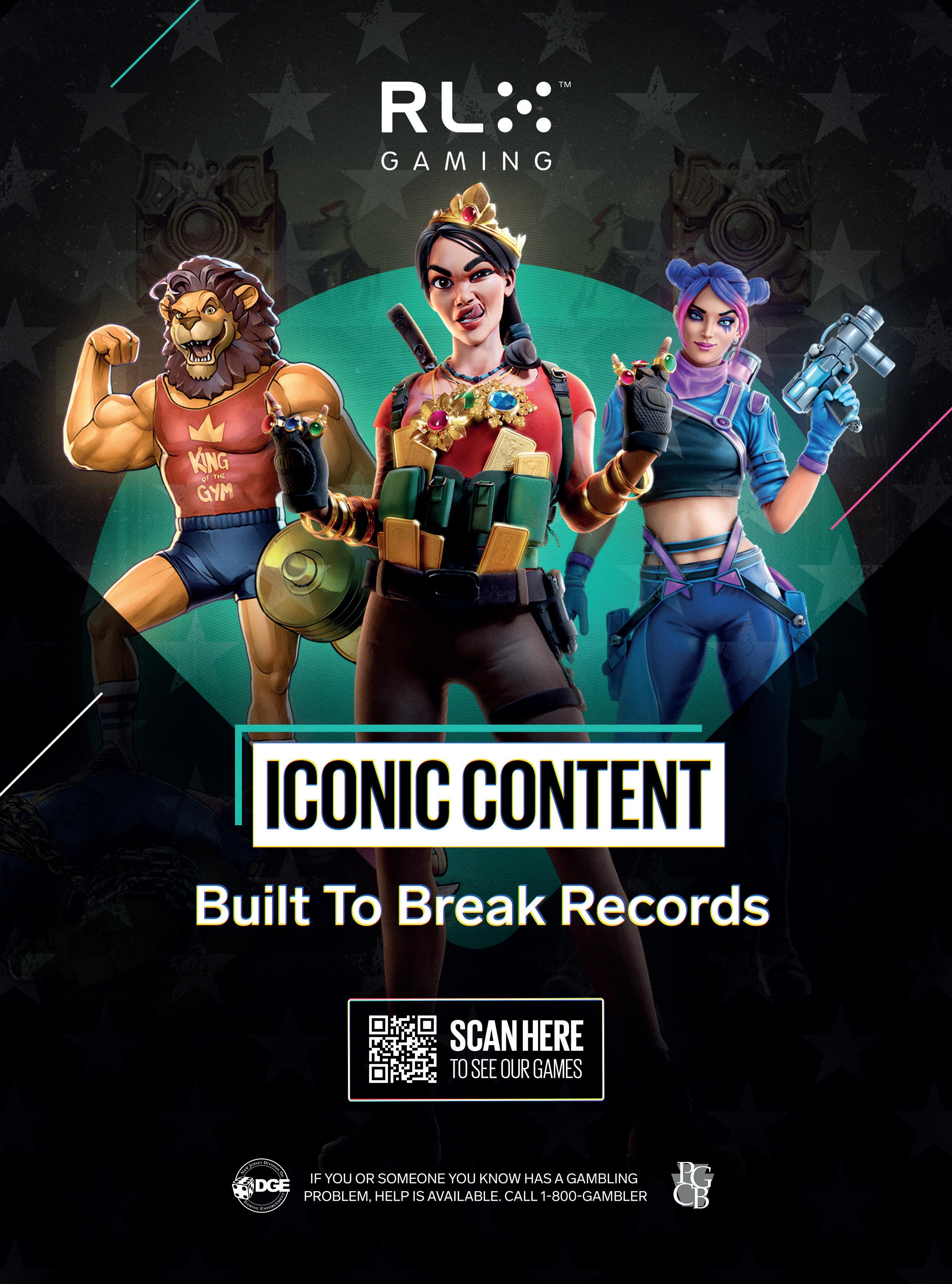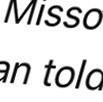




























Gaming America examines the surging popularity of sweepstakes casinos in the US, and what a potentially lucrative future may hold amid concerns surrounding legality and regulation.

THE VARIETY OF VEGAS: We review the Horseshoe Las Vegas & the Venetian Las Vegas
HISTORY OF DOWNTOWN: Oliver Lovat keeps us in Las Vegas with another deep dive
MARKET FOCUSES: We zone in on New York, New Jersey and, across the border, Mexico


COO, EDITOR IN CHIEF
Julian Perry
CONTRIBUTING EDITOR
Tim Poole
STAFF WRITERS
Laura Mack, Kirk Geller, Beth Turner, Ciaran McLoughlin, Will Underwood
LEAD DESIGNER
Olesya Adamska
DESIGNERS
Claudia Astorino, Callum Flett, Gabriela Baleva
JUNIOR DESIGNERS
Medina Mammadkhanova, Tsvetomir Dikov
ILLUSTRATOR
Judith Chan
MARKETING & EVENTS MANAGER
Mariya Savova
FINANCE AND ADMINISTRATION ASSISTANT
Dhruvika Patel
PUBLISHING ASSISTANT
Abi Ockenden
IT MANAGER
Tom Powling
COMMERCIAL DIRECTOR
Deepak Malkani
Deepak@playerspublishing.com
Tel: +44 (0)207 729 6279
US BUSINESS DEVELOPMENT MANAGERS
Erica Clark
Erica.Clark@playerspublishing.com
Tel: +1 702 355 0473
Casey Halloran
Casey.Halloran@playerspublishing.com
Tel: +1 702 850 8503
SENIOR ACCOUNT MANAGER
Michael Juqula
Michael.Juqula@gamblinginsider.com
Tel: +44 (0)203 487 0498
ACCOUNT MANAGERS
William Aderele
William.Aderele@gamblinginsider.com
Tel: +44 (0)207 739 2062
Irina Litvinova
Irina.Litvinova@gamblinginsider.com
Tel: +44 (0)207 613 5863
Serena Kwong
Serena.Kwong@gamblinginsider.com
Tel: +44 (0)203 435 5628
Tracey Frost
Tracey.Frost@gamblinginsider.com Tel: +44 (0)203 882 9693
AWARDS SPONSORSHIP MANAGER
Michelle Pugh
Michelle.Pugh@globalgamingawards.com
Tel: +44 (0)207 360 7590
CREDIT MANAGER
Rachel Voit
WITH THANKS TO:
Sweepstakes were the talk of G2E 2024 and are generating plenty of headlines as we enter 2025.
It is a fascinating vertical – and indeed whether it should even be seen as a legal vertical at all is in question. The American Gaming Association (AGA) has been keen to stress that sweepstakes gaming needs regulation, while a court in North Carolina recently deemed sweepstakes machines to be illegal.
Our cover feature attempts to address and explore this very conundrum: what is sweepstakes gaming? Is it the future of our industry or a mini-episode in gaming history that will generate billions in revenue with a short shelf-life?
Within this magazine, we speak to affiliates, suppliers and legal experts, as well as the AGA and newly formed Social and Promotional Gaming Association to find out more. In essence, sweepstakes is a form of social gaming that finds a brilliant loophole within gaming law. A player can enter a draw, subscribe to win prizes or simply buy virtual currency, then bet with that currency. No transaction is made with real money to place a wager; there is simply an extra step in between and this has put the industry well ahead of regulations.
The question now, however, is whether lawmakers and regulators will respond by outlawing the practice in the long term. It is notable that certain firms speaking to Gaming America have deliberately chosen not to engage with sweepstakes due to this uncertainty. Others who have, though, have quickly seen sweepstakes become their main source of revenue.
Elsewhere in our first issue of 2025, regular contributor Oliver Lovat brings us what many are billing as his best article yet – as he details the history of Downtown Las Vegas. Detail being the formative word!
There are also interviews with Playstar, Golden Matrix Group and Internet Vikings, while we additionally examine market characteristics in New York and New Jersey in comparison to Nevada.





Samir Mowad, Mike Salvaris, Chris Cylke, Manuel Stan, Allan Turner, Stephen Crystal, SPGA, John Feldman, Jon Bowden, Brian Goodman, Oliver Lovat, Rickard Vikström, Nick Patrick, Brooke Fiumara, Sophie Thomas, Brett Vela, Jason McCulloch, Aruze, Ainsworth, Interblock, Eclipse and AGS.
Gaming America magazine ISSN 2632-766X Produced and published by












Across the border, we look at the fascinating market of Mexico, widely acclaimed as the second-biggest market in Latin America behind Brazil. In terms of regular features, our Viewpoints segment looks ahead to 2025 with industry predictions, while we have our usual array of product reviews of what's new on the casino floor.
Impeccably as ever, regular casino reviewer Laura Mack is on hand to compare the Horseshoe Las Vegas and the Venetian Las Vegas. They are two very different properties, but how well do they cater to their respective audiences?



There's all that to look forward to and more in our first edition of 2025. So we trust you will enjoy the magazine – and we look forward to keeping you well informed with the very best industry analysis throughout the year.

JULIAN PERRY, COO, Editor-in-Chief













After completing a $435m transformation, Gaming America speaks with Caesars New Orleans SVP and GM Samir Mowad regarding plans for his newly redesigned property and how it will take advantage of popular sporting events occurring in the city.
Gaming America provides a detailed look into the highest online sports betting tax rates currently in place across the US, including states such as New York, Pennsylvania and Nevada.
The 11th annual Global Gaming Awards Americas took place during the 2024 Global Gaming Expo (G2E) in the Venetian Ballroom, as Gaming America recounts celebrating the very best in the gaming industry over the previous 12 months.
Gaming America’s Laura Mack studies the concerns with US iGaming expansion and the resolutions offered by supporters during the G2E event in Las Vegas.






Pro League Network Co-Founder and Partner Mike Salvaris speaks with Gaming America to summarize 2024 and provide inside knowledge on what his company has planned for 2025.
Having received the opportunity to experience both the Horseshoe Casino and the Venetian Resort Hotel in Las Vegas, Gaming America compares the two properties and their amenities head-to-head in an extensive review.
With the online gaming type having grabbed numerous headlines during 2024, Gaming America’s Kirk Geller offers a comprehensive overview about the evolution of sweepstakes casinos as well as concerns surrounding proper regulation.
John Feldman, Partner at global law firm Reed Smith, speaks with Gaming America on the blurred views of how sweepstakes casinos can eventually see proper regulation.







PlayStar CMO Jon Bowden sits down with Gaming America to discuss the company’s promotional collaboration with the New Jersey Devils and his takeaways from G2E 2024.
The Co-Founder and CEO of Golden Matrix Group takes time to speak with Gaming America about the expanded portfolio his company showcased at G2E, its outreach into the Brazil market and its performance throughout 2024.
Regular Gaming America contributor Oliver Lovat analyses how Downtown Las Vegas came together in crisis and created transformative legacies, in a truly in-depth evaluation.
Gaming America reviews the landscape of sports betting in the US by observing the states which have been historically dominant, Nevada, New Jersey and New York, since sports betting became possible in 2018.

Internet Vikings Founder & CEO, Rickard Vikström, speaks with Gaming America about the outlook of US gaming in 2025.
Ahead of major changes to the Latin American market in 2025, Gaming America explores current operations in Mexico as the country represents a bridge between North & South America.
Industry experts offer their predictions as to where the gaming industry will see growth throughout 2025 and what notable trends could occur as companies close the books on 2024.
Gaming America checks out the latest product launches to hit the market, including those from companies such as Eclipse Gaming, Interblock, Ainsworth Gaming Technology and more.
In this edition of From The Top , Caesars New Orleans SVP and GM Samir Mowad speaks with Kirk Geller to detail what the future holds after the property finally completed its $435m transformation.

With such a long transformation, what was the process behind this launch?
This was supposed to be about a year ago, if I’m being completely honest. The genesis of this project all goes back to pre-Covid because our original lease with the state dated back to 1999, and so it was set to expire in 2024. We wanted to try and get ahead of it years ago and agreed to invest capital.
The original agreement with the state was they would extend our license for 30 years and we would spend a minimum of $325m upgrading, renovating and adding a hotel tower. Our license here is unique because we are the only truly land-based, and urban-based, casino in Louisiana. If we go back to pre-Covid, there’s been a lot that’s happened in the last five years that have thrown a few hiccups in there, but the final timing of getting to open before the
Super Bowl gives us enough time to be operationally ready.
Even the opening weekend of our hotel was Taylor Swift, which was another great weekend for the city and for business here. While our plan might have been to open about a year ago, I would tell you that things couldn’t have worked out better.
Not to delve too much into the negative, but what type of delays did the property see because of the Covid-19 period?
Supply-chain issues were the biggest piece of it and then certainly inflationary pressures. For our project, we’re going to be north of $400m, probably closer to $420m or so when it’s all said and done. Particularly because we did not want to value engineers down to the number that we were contractually obligated to.
In fact, we wanted to do it the right way, and if we’re going to bring the Caesars
brand, our best brand, to what I biasedly think is the best city in the US, we decided to do it right. Thus, the budget was increased versus trying to save money in order to hit a number.
What has your experience been like running the property, and why is this transformation so key for the future of Caesars in New Orleans?
My experience has been incredibly positive, almost dream-come-true type of stuff. I’m originally from here. In fact, I’m the first GM of Harrah’s or Caesars New Orleans who’s ever actually been from New Orleans.
I started with the property 19 years ago, before Hurricane Katrina, which had me moving all around the company. I came back about four years ago and got to head off this project. I would tell you that being able to be home, some of the advantages I have with knowing the players, the city, the landscape, that’s all been positive. I still know people that work here now that worked here 19 years ago.
While, of course a project of this scale comes with challenges you have to overcome, but working with such a great team, we’ve been able to get the results we want; which is really the most exciting part.
How can your property push its sports betting offering ahead of the Super Bowl and college football games held in the city as well?
Of course, there’s a digital side of the business that is driven more by that separate arm of our company, but from a

“WHILE OUR PLAN MIGHT HAVE BEEN TO OPEN ABOUT A YEAR AGO, I WOULD TELL YOU THAT THINGS COULDN’T HAVE WORKED OUT BETTER.”
bricks-and-mortar perspective, we have in-person betting windows, we have kiosks on property. In addition to that, there’s a sportsbook team from Caesars Digital that sits here in New Orleans, and they attempt to activate the Caesars sportsbook brand and get word out about the app itself.
All of that works hand in hand. We’re going to have a special activation area on property, so people not only learn about the digital arm but also either view games and or make bets in-person at windows such as what was traditionally done in Las Vegas before the PASPA ruling.
It’s a big part of what we’re going to be doing and it’s a big reason too, as to why we use both the Super Bowl and those college football games; plus things like the Final Four and Taylor Swift concerts that were just in New Orleans. That’s why we did the naming rights deal with the Caesars Superdome, so it all has that ability to work together.
With New Orleans obviously such a popular tourist destination, how will the transformation help Caesars stand out in the city's competitive tourist landscape?
I think that 20-plus years ago when we opened Harrah’s New Orleans, Harrah’s was the right brand for New Orleans. Harrah’s has that kind of ‘Mardi Gras’ theme, but as the city’s evolved and we’re now an international destination, bringing our best brand, Caesars, to such a destination city like New Orleans was the perfect fit.
We believe rising tides lift all boats. Up to half of our business is not local business, it’s national and beyond. Harrah’s was a great brand then, but I think the Caesars brand is going to amplify all of that visitation and make us even more of a destination.
How does New Orleans differ from those other markets you’ve had the opportunity to work in?
We have destination casinos like Las Vegas, Atlantic City or even in places such as Lake Tahoe, in Reno; but we also have ‘locals’ casinos that cater more to the local population, and those are spread across the US specifically towards the middle markets.
In New Orleans, what sets us apart

is people go to Las Vegas for a gaming experience or Las Vegas Strip experience, but you can come here for the New Orleans experience, and you can be right in the middle of the action because we’re the only downtown land-based casino. We’re on the corner of Canal and Poydras, the two most iconic streets in the city. Even with all that, guests can still get that Caesars experience, as we have now upgraded this property, added rooms and added all these amenities to the point where customers get the best of both worlds.
Is there still room for both Harrah’s and Caesars to work together in tandem?
This project is definitely about bringing the Caesars brand to New Orleans and about using that brand to make an already strong destination and business even stronger. Certainly, from the casinos within our portfolio, our brands all speak for themselves and stand for themselves. But Caesars Rewards is the common theme that ties it all together. Even as we debut the brand-new Caesars property and move from the successful Harrah’s Hotel, the Caesars Rewards brand helps to bring all that together.
What does the future hold for Caesars New Orleans? Will focus now be put towards the Super Bowl and upcoming college football events being held in the city?






















It’s a combination of all of those things and bringing that southern hospitality to the forefront. Whether guests are looking for that hospitality on the gaming floor or in our new restaurants, that’s really what our focus is, and those events are what make New Orleans great.
SAMIR MOWAD GM & SVP Caesars New Orleans
We’re going to be Caesars New Orleans whether it’s Mardi Gras, Jazz Fest or French Quarter Fest, in the same way. New Orleans will have the Final Four, the Super Bowl and the Sugar Bowl as well, so it’s our job to prepare ourselves for those events but also keep focus on proving the hospitality the city is known for to our guests.






3200 E Camelback Rd Ste 190 Phoenix, AZ 85018
602-265-8223
yasemin.charles@mutualofomaha.com
https://agents.mutualofomaha.com / agents/az /phoenix/yasemin-charles
Gaming America looks at sports betting tax rates across the US, with percentages varying from as low as 6.75% to as high as 51%.
Joining Nevada as the other state to offer a 6.75% online sports betting tax rate, Iowa doesn’t generate quite the same sports betting handle as Nevada each month, but still reported a handle of $295m for October 2024. Online wagering accounted for nearly $275m of the total handle throughout the month, with the state receiving just over $1.2m in taxable revenue during the period.


Nevada is tied for having the lowest online sports betting tax rate of all eligible markets in the US at 6.75%. The state reported total gaming win of over $1.28bn in October 2024, with nearly $18.8m having been generated from online sportsbooks. Nevada also imposes a 24% federal tax rate for any winnings that amount to over $5,000.
Michigan imposes an 8.4% online sports betting tax rate, with taxes spread out between the state’s internet sports betting fund, the city of Detroit and the Agriculture Equine Industry Development Fund. The state’s online sports betting handle increased 5.1% year-over-year for a total of $560.4m for October 2024.


While some lawmakers believe the state should consider implementing a higher sports betting tax rate, Arizona currently enforces a 10% rate for any online sportsbooks operating in the area. The state consistently generates sports betting handle of at least $400m, leading to more than $2m in monthly tax contributions from operators.


Arkansas chose to vary its online sports betting tax rate depending on revenue, with a 13% tax rate enforced for the first $150m in revenue, and 20% for any amount above that threshold. While the state eclipsed its 2023 revenue total by October 2024, the figure appears that it will come in closer to $50m than $150m for the remainder of 2024.
Pennsylvania represents the first drop in online sports betting tax rate, but still enforces the fourth-highest rate at 36%. As of November 2024, the state has generated more than $2.7bn in gross sports betting revenue, leading to nearly $670m in tax dollars having been collected by Pennsylvania as a result.
On July 1 2023, Governor Mike DeWine of Ohio asked for the tax rate on sportsbook operators to be increased to 20% from the original 10% approved in late 2021. Gov. DeWine’s wish was granted and the new tax rate has been implemented in the state ever since. Online bettors in Ohio generated handle of $842.4m for October 2024, with the state collecting over $100m in taxable revenue throughout the year up to this point.


Indiana currently has over 40 online sportsbook operators permitted within the state, with House Bill 1015 including a 9.5% tax rate for all companies. As of October 2024, the Indiana Gaming Commission reported that the state generated nearly $14.2m in sports wagering tax through the year, including just over $3.3m during October alone.
In November 2021, the New York State Gaming Commission chose nine operators to launch online sportsbooks in the state. At the same time, the Commision implemented a 51% tax rate for each of its online sportsbooks, tied for the highest rate out of any state where online sports betting is legal. The state reported a sports betting handle of over $2bn for both September and October 2024.


Vermont is one of the most recent states to legalize online sports betting following the enactment of House Bill 127 on June 14 2023. While retail sports betting is still unauthorized, the state chose to implement an online sports betting tax rate of 31.7% for operators such as DraftKings, FanDuel and Fanatics. The tax rate represents the fifth-highest across eligible markets.
Maine is relatively new to the online sports betting scene, only seeing the format go live in November of 2023, choosing to implement a 10% tax rate for all operators. However, revenue for October 2024 decreased over 41.5% from September, generating a taxable revenue of just $385,000.

Despite not having any professional sports teams in the state, New Hampshire has seen a heavy rise in online sports betting popularity ever since its debut back in December 2019. Throughout 2024, the state reported sports betting handle averaging over $70m each month, but New Hampshire does equal New York by having the highest tax rate for online sportsbooks at 51%.
The third and final state to implement an online sportsbook tax rate of 51%, Rhode Island was also one of the first states to legalize sports betting after PASPA was repealed in May 2018. Like New Hampshire, Rhode Island has a negotiated monopoly with DraftKings, naming the operator as the sole online sportsbook provider in the state.
The state of Massachusetts represents the first to impose an online sports betting tax rate of 20%, joining Ohio and Arkansas to be tied for the sixthhighest rate in the US. Throughout October 2024, the state collected nearly $10m from online sports betting revenue, reporting an online betting handle of almost $735m during the month alone.

The 11th annual Global Gaming Awards Americas once again honored and rewarded the gaming industry’s strongest performers throughout the prior 12 months during G2E in Las Vegas.

As many of the gaming industry’s most respected individuals filed into the Venetian Resort Las Vegas for the 11th annual Global Gaming Awards Americas, an excitement could be felt as all eagerly anticipated whether they would be taking home one of the most trusted and prestigious Awards in the industry.









































With companies always nominated based on merit and the reason for their nomination made public in the official Shortlist magazine, the Global Gaming Awards Americas have gained respect among industry heavyweights, due to the strict rules and procedures put in place. Whether it is land-based, online or through hospitality, the gaming industry’s strongest per formers joined Gaming America at the 2024 Global Gaming Expo (G2E) to celebrate those which had gone above and beyond throughout the prior 12 months.





























































































Mariya Savova, Global Gaming Awards Event Manager, says: “We now have three Global Gaming Awards events a year, recognizing the best of the best in the EMEA, Asia-Pacific and Americas gaming industry, respectively. Our Las Vegas Awards remain our flagship event and a highlight of the year for our team. The gaming industry is growing across all regulated markets worldwide, but it goes without saying that the US leads the way, which is why the


















































































Global Gaming Awards Americas are so competitive and coveted. All shortlisted companies are worthy of winning. Those who actually left the Venetian Ballroom with an Award should be extremely proud as the competition has been fierce."
There was incredible anticipation in the air as each executive filled the Venetian ballroom to witness which would be honored with one of the most desirable
























awards in the business. With the timing of the Awards being held at the start of G2E, this allows for the day to be dedicated to the prospect of taking part in the celebration. Gaming America showed every guest to their table and opened the event with a recap of what was an eventful 2024 in the gaming industry. Easily displayed by the abundance of attendees for G2E and the Awards itself, there was no shortage of representation as to how much the space had grown in the prior 12 months.

During G2E, the vast majority of the gaming industry comes together to share insight and provide a look into what the future will hold for the space, but it’s also a time to celebrate those who managed to outperform even the highest of expectations.
Companies such as FanDuel, Wynn Resorts and Aristocrat Gaming were all honored with awards during the event, covering every sector of the gaming industry.

FanDuel CEO Amy Howe represented the company and took home Awards for both Digital Operator of the Year and American Executive of the Year, as FanDuel became the leader in both iGaming and sportsbook market share.
Howe has now won the American Executive of the Year award at three consecutive Global Gaming Awards Americas, an incredible feat after becoming

FanDuel’s CEO in February 2021. Indeed, FanDuel only continues to grow its reach under Howe’s leadership.
North America Property of the Year went to Yaamava’ Resort and Casino at San Manuel, as the San Manuel Band of Mission Indians was also honored with the Responsible Business of the Year Award. The San Manuel Band of Mission Indians took home the Responsible Business of the Year Award for the fourth consecutive year, showcasing the dedication the Tribe exemplifies when expanding its presence in California and Las Vegas.
The Awards were presented by representatives of the sponsors for each category, giving a brief introduction to the recognition every shortlisted company received prior to the winner being announced. The atmosphere in the room was one of hope, respect and a sense of accomplishment.
There were over 40 tables filling the ballroom with numerous executives from each shortlisted company in attendance. The room was packed by people who had played a role in bringing the gaming industry to new heights in 2024, taking the time to converse and reminisce about the headlines that took prominence during the year. A feeling of genuine comfort even set in as the Awards always provides hospitality comparable to the same commitment shown by the companies being honored.




As every winner came up on stage to receive the award, the excitement and positivity could be seen on their faces, with the feeling of being recognized for days of long hours and tough work felt throughout the room. The celebration ended with a recap of those who were honored on the day, as well as giving thanks to everyone in attendance for joining Gaming America at the event and paying respect to the winners.
Savova said: “Once again, I would like to congratulate all 2024 winners on behalf of our entire team – your dedication to innovation and excellence is what drives our industry forward! I would also like to take a moment to say thank you to all event sponsors for supporting us, to G2E and the AGA for giving the Global Gaming Awards Americas a home, to the KPMG team who handles the voting adjudication, to all executives who attended the event, and of course to my esteemed colleagues at Gaming America and Gambling Insider who help make every Global Gaming Awards event a success."
The 11th annual Global Gaming Awards Americas was a spectacular event that continues to celebrate the very best in the gaming industry year after year. As always, having the ability to honor those in the industry during G2E brings a unique opportunity to bring many of the highest-ranking executives together for this incredible affair. In the years ahead,

the Global Gaming Awards will continue to serve as the most prestigious and trusted Awards in the industry across the globe.
The Global Gaming Awards Europe, Middle East and Africa (EMEA) will be heading to Barcelona on January 20 2025. With the Shortlist having been finalized on November 11, companies and executives saw the Shortlist revealed on December 23. Like the US, gaming markets in Europe, the Middle East and Africa are rapidly growing, with the Awards set to recognize those which have succeeded in harnessing the new demand and turning into new opportunities.
With such a multitude of fast-growing markets in the US, the gaming scene will constantly evolve and innovate to meet the quickening demand of its consumer base. The companies, executives and properties celebrated at the Global Gaming Awards Americas find ways to not only continue meeting these demands, but discover how to break new ground in an ever-expanding industry.
The Awards are set to return to Las Vegas during G2E 2025, with an increasing number of trends set to headline what should be an eventful year for the gaming industry. As always, the Global Gaming Awards Americas will reward those that find ways to expand their horizons, maintaining its reputation as the most prestigious and trusted Awards in the industry.










































































A deep dive into the lively debate: Gaming America’s Laura Mack examines the objections to US iGaming expansion and the mythbusters offered as a rebuttal at G2E. Surely, it is inevitable in the long run?
With iGaming expanding around the world, some US states have begun to raise concerns regarding what effects online casino could have on other legal gambling markets. In recent months, online gaming has therefore become a topic of controversy in several states and throughout the country at large. Since the Supreme Court overturned PASPA over six years ago, legal sports betting has rapidly spread throughout
the country. Along with the District of Columbia, sports wagering is legal in 38 states and counting. However, the legal online gaming market has not experienced the same explosive expansion as sports betting.
To date, online gaming being legal in some form has been limited to just seven US states by comparison, although even some of those have limited access, such as online poker
only. States with legal iGaming access include Pennsylvania, Delaware, Nevada, New Jersey, Rhode Island, West Virginia and Connecticut. But why hasn’t the market taken off the same way as sports betting?
There are a variety of factors, of course, but one main reason appears to be states raising concerns that legal online gaming markets could potentially harm the land-based industry. Those






jurisdictions have hit the pause button on iGaming, claiming the industry could cannibalize brick-and-mortar casino revenue. Lawmakers in the state of Maryland this year considered whether opening its borders to legal iGaming would benefit the local economy. With the topic of possible iGaming legalization on the table, the Maryland Lottery and Gaming Control Agency studied the effect online gaming could have on the state.
Maryland welcomed legal retail sports betting in 2021. The state opened its online sports wagering market the following year. However, iGaming has not gained traction in the state because some feel bringing online gambling onto the scene could pose a threat to workers in land-based casinos and put jobs in jeopardy. This reservation is not solely a concern in Maryland. The debate regarding iGaming and the impact the market could have on land-based businesses has caused other states in the US to consider whether welcoming legal online gaming is a good move for their territories. Opponents say bringing iGaming onto the scene could pose a threat to workers in land-based casinos and put their jobs in jeopardy. Do these objections have any merit? Some analysts say they do. In a 2021 study conducted by Deutsche Bank that looked at iGaming’s effects in Pennsylvania, research showed a decline in revenue at brick-and-mortar casinos that coincided with the launch of the state’s online gaming market. Pennsylvania began offering players online gaming in July 2019. During its initial seven months, the state generated nearly $10m in revenue. As of January 2024, the state’s iGaming handle had reached nearly $3.2bn. Based on its findings, Deutsche Bank analysts noted that “Pennsylvania should take into account that land-based casino revenue was dropping due to the fact that iGaming was eating into their market share.” Analysts based their conclusions on comparing Pennsylvania’s results to productivity in other states
“AT THE END OF THE DAY, IGAMING DOES NOT IMPACT
with legal land-based casinos.
According to the findings, landbased casino revenue during March 2021 fell by 12%. Revenue in April rose by 1% but dropped by 3% during the month of May. During those months, several new land-based casinos opened in the Philadelphia area, yet there was a decrease in activity. However, researchers acknowledged the impact the Covid-19 pandemic had on the market and on the economy at large during the time of the study.
An additional recent study in New Jersey conducted by the National Economic Research Associates (NERA) found that the cost of programs to combat problem gambling within the state offset the tax contributions that iGaming provides monthly.
New Jersey’s iGaming market debuted in 2013 and though iGaming in the Garden State brings in a significant amount of tax revenue, the study revealed that fewer people are employed to provide iGaming services than those working in the state’s land-based counterparts. However, iGaming revenue continues to grow in the Garden State. During the month of October, the New Jersey Division of Gaming and Enforcement reported that the state’s online casinos and their partners walked away with $208.1m in revenue. But not everyone agrees with the NERA study findings. Trade association iDEA Growth recently published research refuting the NERA study, which claimed that legalized online gambling in the Garden State “resulted in a $2bn boost to New Jersey’s economy from 2013 through 2018.”
iDEA Growth disagreed with NERA’s findings and said the economic impact in New Jersey was much larger than the study suggested. The group went on to note that NERA’s findings were “erroneous” and were “found to be based on flawed and limited assumptions and analysis, severely underestimates the financial benefits iGaming brings to the State.” The group
went on to note that existing research backs up the claim that legal iGaming “does not cannibalize revenue from brick-and-mortar casinos or other entertainment sectors.”
Reports from both Pennsylvania and New Jersey reflect lucrative tax revenues and handles that far exceed what both states brought in when their markets first launched.Going back to Pennsylvania, another study there highlighted survey data that reflected a rise in online gaming activity.
The Pennsylvania Department of Drug and Alcohol Programs published a survey in connection with Pennsylvania State University during 2021. According to the report, nearly one in 10 residents participated in online gaming. The survey also found that 28% of Pennsylvania residents said they have engaged in some form of gambling during the past 12 months.
Though the rising revenue numbers in states with legal iGaming do not lie, the debate continues around the country. During the most recent G2E show in Las Vegas, several panels addressed iGaming concerns and the potential benefits that expanding the US market could offer.One presentation addressed the debate head-on as part
of an educational breakout session. The panel was led by politician and Fanatics lobbyist Brandt Iden, along with Soft2Bet CBDO Martin Collins.
Iden was instrumental in bringing legal iGaming to the state of Michigan. During the panel discussion, he listed three common “false narratives” that exist when it comes to expanding the US iGaming market, which include cannibalization and job losses, a potential rise in problem gambling and that iGaming is not broadly supported.
Iden used the Great Lakes State as a case study and as evidence that the common objections to denying iGaming access do not have merit. He provided recent tax revenue figures from Michigan to back up his claim. During the 2023 fiscal year, the Great Lakes State collected $23m in state government taxes from its sports betting market – iGaming yielded $486.5m in taxes for the same period.
He also cited a recent report released by Vixio and Light & Wonder iGaming tax revenue across 44 states could bring in an estimated $15bn. When addressing the concern that legal iGaming could potentially cannibalize land-based markets, Iden said the argument “is absolutely false.”
“COMPELLING ARGUMENTS AND CORRESPONDING RESEARCH EXIST ON BOTH SIDES OF THE IGAMING ISSUE. NEVERTHELESS, WE CAN ALL BE CERTAIN OF ONE THING: THE IGAMING MARKET IS HERE TO STAY; EXPANSION SEEMS INEVITABLE BUT, AT THE SAME TIME, FAR FROM IMMEDIATE.”
He said, “At the end of the day, iGaming does not impact the retailbased industry. In fact, it’s just simply another experience for the consumer to be able to participate in a regulated entertainment product.” Iden went on to explain that customers can enjoy the same product in different ways, and used his own experience of eating food from the same restaurant both by stopping by the business and by ordering food using Uber Eats.
During his portion of the session, Collins examined how iGaming is affecting the Canadian province of Ontario and discussed the legal framework in the province, which has the least restricted access to online gaming in North America.Collins noted that adding iCasino options in Ontario “has improved the accessibility of online gambling service providers in the province.”
Along with Iden and Collins, other leaders are hopeful the US will warm up to an expanded iGaming market soon.Play’n Go CCO Magnus Olsson noted that despite the slow expansion of iGaming throughout the US, the company’s goal is one of ongoing expansion within the existing market. “We’re hoping to be very successful here in the US, getting more protections in place as states open up and helping the states raise revenue without raising taxes,” Olsson said.
“Obviously things are moving a little slow. We knew this year would be slow in particular. We’re confident in 2025 and beyond for many factors, and we believe more states are going to be open. So, we’re on our plan as the company being every regulated jurisdiction.”
Compelling arguments and corresponding research exist on both sides of the iGaming issue. Nevertheless, we can all be certain of one thing: The iGaming market is here to stay; expansion seems inevitable but, at the same time, far from immediate.
























Gaming America sits down with Pro League Network’s (PLN) Mike Salvaris at The Venetian during G2E, to sum up the year and give us the inside scoop of what sports betting has in store for 2025.
What challenges did PLN face this year and how did the company overcome them?
For one, cementing a regular schedule of events was important for us this year. One of the big goals of 2024 was centered around building our audience – and we’ve done that. We do around 10 million impressions a week on our own operated social, and that’s up from about nine million impressions this time last year. We’ve been growing a lot and the key to that has been the consistency of the
content we produce; the consistency of our events, alongside the types of sports that we do.
We did quite a few events at the start of the year during the first quarter. Then, we went quiet for a short while as we were planning the rest of our schedule. We got started again in the past three weeks or so, relaunching a new putting tour, among other things. Starting that engine up again and building the regular content has taken a few weeks to adjust
to, but I feel like we’re riding the rhythm now, and we’re ready to roll.
You have announced a partnership with Abelson Odds. Can you share what other collaborations you have in the pipeline?
I can say a few. We have a collaboration coming up with a very large influencer that is working with some of our sports, which is great. Moreover, a few other partnerships with operators, fantasy and providers. I









don’t want to say too much, but we’re really excited about what we have in store.
How do you see the sports betting market evolving within the next few years, and how will PLN fit into that landscape?
I think there’s been a sudden realization that offering different types of content really matters. If you think about the first few years of post-PASPA, the lower demand allowed people to simply get by with live sports like football and the NBA, which everyone knows about and wants to see.
I think that, over time, there’ll be even more of an increase in diversity when it comes to operator’s offerings. We’re seeing an increased realization that there are gaps in the calendar when there are no major sporting events. However, on top of that, there are other opportunities when those sporting events are running that are centered around an increased demand for content, designed to pull people back to a




given platform to get more engagement. The way you’re going to get that engagement is through the kind of sports that PLN offers. Indeed, that’s why we started PLN
















































































































































a couple of years ago. Because of our background – 20 years in sports and gaming – we know the importance of keeping one eye on the clock and calendar at all times to seize those gaps. It’s simple metrics, right? When we first came to G2E as Pro League Network two years ago, I struggled to get two meetings for the whole group. This time around, I think I’ve had 43 meetings. We feel there has been an increase in interest in what we’re doing; alongside a realization of the value we can provide to the industry.
MIKE SALVARIS Co-Founder Pro League Network
I think you’re going to see a lot of interesting things on the content distribution side from us. You’re also going to see a lot of interesting things surrounding audience development. We feel we’re about to get another inflexion point in our growth in terms of the change in the awareness of our sports offerings, and we’re super excited about that.






















The Venetian Las Vegas and Horseshoe Las Vegas serve very different clienteles. But who does it better? Gaming America’s Laura Mack visits the two Las Vegas properties to see which will take the title in this latest casino matchup.
Las Vegas offers a wide variety of entertainment hotspots, whether you prefer a high-end casino and hotel experience or are looking to pass the time at the slots or table games against the backdrop of an oldschool aesthetic.
During my recent trip to Vegas for G2E 2024, I paid a visit to two casinos on the Strip, one from each of these categories. I explored what Venetian Resort Las Vegas
has to offer, as well as Horseshoe Las Vegas, which is owned and operated by Caesars Entertainment.
As is my custom, I will score these casinos based on qualities I find essential for a good entertainment destination, which include cleanliness, dining, look and layout, variety of games and guest services.
For extra fun, let’s score this matchup like we would during a game of HORSE.
The rules for the game are simple, for those who might not be familiar with how this basketball game is played. The first player shoots and makes a basket from a particular spot or angle. The second player must make the shot the exact same way to keep from earning a letter.
The first competitor to spell out HORSE loses the game.
However, I will modify the rules a bit and give the casino that does not take the category a letter. Otherwise, this contest could be lengthy quickly!
Let’s look at the history of each location before we move ahead with this challenge. Venetian Resort Las Vegas stands on the previous home of the Sands Hotel, which was imploded in 1996. Prior to the Venetian’s construction, architects and artists traveled to Venice, Italy to seek inspiration for the Renaissancestyle destination. Construction was completed on the resort in 1999.
The Venetian Resort recently released details on plans to update its convention center for an estimated cost of $188m. The company said the renovation of its meeting space will be “completed in stages between 2024 to 2026.”
The concept is based on celebrating the resort’s past, while “reinventing the future.”
The Venetian also recently hosted G2E 2024.
Caesars Entertainment currently owns and operates Horseshoe Las Vegas. Since the brand’s formation in Reno, Nevada in 1937, Caesars Entertainment has expanded over the years to include facilities that operate under the Caesars, Harrah’s, Horseshoe and Eldorado brand names.
Today, casino guests enjoy the facility under the Horseshoe Las Vegas name. However, the site itself has a rich history that spans more than 50 years.
Horseshoe was previously known to Las Vegas locals as MGM Grand Hotel and Casino. The destination opened for the first time on December 4, 1973. The original structure included a 26-floor hotel with nearly 2,100 rooms and was known as one of the largest hotels in the world at the time.
On November 21, 1980, nearly seven years after its debut, the hotel caught fire and killed 85 people. The disaster was noted as one of the worst high-rise fires in US history.
The following July, MGM Grand reopened
after undergoing a $50m rebuild. The new 26-floor hotel expanded its capacity to more than 2,800 rooms and implemented additional fire safety features.
In 1986, Bally’s Manufacturing purchased the property and renamed it Bally’s Las Vegas. Caesars Entertainment later acquired the facility and rebranded it as Horseshoe Las Vegas in December 2022. Now, let the game begin!
This was a difficult category to score because neither casino was dirty or messy. However, both casinos allow smoking indoors, so I found several slots with used ashtrays as I played.
Though both places were clean and free of trash, I found the Venetian went above and beyond to keep the gaming floor looking nice. I was also impressed with the spotless condition of the bathrooms at the Venetian. Staff members were often wiping down sinks and keeping the floor swept during the times I used the restroom while at the Venetian.
So, the Venetian takes the first category, giving Horseshoe Las Vegas the letter H.
Horseshoe offers its guests access to 10 restaurants, including Guy Fieri’s Flavortown Sports Kitchen and Jack Binion’s Steak.
A major plus for this casino hotel is its 24-hour access to the Horseshoe Food Hall. This area of the resort serves American classic meal staples like burgers, pizza, sub sandwiches and hot dogs.
The food hall has four eateries, which is a great option when you need a break from winning or need to step away from your favorite slot or table game to recharge.
The Venetian offers a variety of dining and bar choices as well – 61 to be exact –no matter the time of day and what your budget allows. While visiting,
getting a meal for as low as $15 - $20 is not difficult.
If you are looking for a place to sit down or options for fine dining, the casino hotel offers that too. However, the place was packed due to the conference, so sitting down at the bar to have a cocktail was challenging.
I appreciated how much space was available for dining on both the main and second floors. While at the Venetian, I had the chance to eat at Yardbird and Sugarcane. These restaurants offer higher-end dining options but still have meals that are cheaper than $30.
Again, this was a tough category because both have great restaurant choices. However, I will give Horseshoe the point because of its 24-hour food court option.
Which gives Venetian a letter H.
Each casino has its advantages and disadvantages in this category as

well. First, we’ll examine Horseshoe. The gaming floor gives people plenty of room to travel from game to game without potentially bumping into someone else, regardless of whether one prefers slots, table games or live poker.
That is a huge plus in my book.
However, I found the layout of the casino floor to be a bit disorganized because the floor is divided into several sections that feel cut off and too independent from the others. Both ends of the casino floor had large groups of slot machines, with nearly all the table games taking up space in the middle of the floor.
This is great for those who do not want to spend a long time searching for a place to sit down and play, but I felt this took away from the flow of the room.
I thought the Venetian’s casino floor was designed well. I like that all the slots are grouped together, and that





overhead directional signage is clearly visible. I also thought the colorful carpet mixed with beautiful hard-surface flooring created a pleasing aesthetic.
The disadvantage to this setup is that someone could easily get lost on the gaming floor. I know I took a few wrong turns more than once while making my way through the casino. Having so many beautifully lit and colorful slots in one place against a Renaissance backdrop left me feeling visually overstimulated at times.
That said, Venetian takes the point on this round because I enjoyed the organic flow of the gaming floor’s layout.
The score: Venetian with H, Horseshoe with H-O.
Horseshoe Las Vegas offers players more than 750 slot machine games, 36 traditional table games and 20 live
poker games spread out through its 68,000 square feet of gaming space.
Now, I am not a table games kind of girl, but the fact Horseshoe features so many table games and live poker choices on its gaming floor was impressive. I was also pleased with the slot machine options present on the casino floor. Despite the smaller space, many new and frequently played games were there.
The Venetian’s 100,000 squarefoot casino features more than 1,000 slots, 225 table games and 37 live poker tables. Along with these gaming options, the casino floor is also home to its Yahoo Sportsbook, powered by William Hill, as well as a high limit room.
Venetian wins this category solely based on scope. Both casinos had many of my favorite games, but I had no trouble finding all of my go-to slots while playing at the Venetian. And, this




















casino offered many fan favorites in multiple denominations.
Our score now stands with Venetian with the letter H and Horseshoe with H-O-R.
Staff at both casinos were friendly and accommodating. However, I noticed that staff at the Venetian were present more often and frequently asked those sitting at slots if they wanted to place drink orders.
I give the Venetian credit for having an attentive staff. However, this was more of a distraction than an opportunity for me to feel pampered. When I’m playing slots, I am fully engaged in the game. Personally, I do not prefer being interrupted by staff offering drinks or a chance to sign up for the casino’s loyalty program.
Again, it is great service and goes above and beyond what I have seen


“I AM NOT A TABLE GAMES KIND OF GIRL, BUT THE FACT HORSESHOE FEATURES SO MANY TABLE GAMES AND LIVE POKER CHOICES ON ITS GAMING FLOOR WAS IMPRESSIVE.”
at other venues. Nevertheless, I have to give Horseshoe Las Vegas the point on this one because of a lack of interruptions.
This brings our final score to Venetian with two letters, H and O, with Horseshoe earning three letters, H-O-R.
So, Venetian will walk away from this challenge as the victor by a narrow margin.

Though these two casinos differ in many ways and take a different approach to their visual presentations, I enjoyed myself at both.
Each casino hotel is a great place to visit and stay on your next pilgrimage to Las Vegas, or on the next business trip in my case!




































Gaming America examines the surging popularity of sweepstakes casinos in the US, and what a potentially lucrative future may hold amid concerns surrounding legality and regulation.




















Over the course of 2024, no online gaming offering took hold of players' attention quite like sweepstakes casinos, which hit revenue figures as high as $8bn throughout the year. Sweepstakes operators around the US have had little issue reporting consistent growth, but the past 12 months have represented historic increases in revenue and consumer activity for the social offering.



Internet Gambling Enforcement Act (UIGEA) became a large factor in the rise of sweepstakes gaming operators. UIGEA prohibited gambling businesses from knowingly accepting payments for online gambling services that were not legally allowed to operate within the US. The law brought the industry to a halt, as credit card companies and banks ceased such transactions.






Players had zero access to any form of online casino options due to the new Act and operators were barred from offering iGaming within US states. However, operators providing sweepstakes sites



The breakout gaming type operates by presenting in-game currency to players, with the ability to receive or purchase sweepstakes coins also included. These coins can then be redeemed for real value by the consumer, such as cash or gift cards, helping to differentiate sweepstakes from similar gaming types such as social casinos. Whereas social casinos put more focus towards engagement, sweepstakes can offer prize structures, promotional events and large reward pools.




















found a loophole to iGaming legalities by utilizing the sweepstakes gaming laws set in place at the time. Players were not obligated to deposit funds to play, but gold and sweeps coins could be provided for free. Sweepstakes sites were giving players an outlet for casino gaming, providing a functional replacement for the real-money sites shut down due to UIGEA. Despite legal changes involving UIGEA and other measures over the years that provided an opportunity for operators to return to the US, most markets still forbid the gaming format. With only six states that currently allow online casinos to operate in the US, sweepstakes casinos have continued to provide an alternative without the need for typical cash investment, which is becoming increasingly appealing to players.






















Where sweepstakes has faced challenges during its rise in popularity is the regulation behind how it is operated, with the American Gaming Association (AGA) expressing clear concern during the second half of 2024 over a lack of player protection. Before delving into the possible protections set to be put into place for customers, there is much history to unpack as to how sweepstakes became the headliner of online gaming in 2024.































































The growth of sweepstakes and social casinos over the course of 2024 has been significant, as the sector has seen a significant increase in user engagement by the consumer, such as cash or gift cards, similar gaming types such as social casinos. Where sweepstakes has faced the second half of 2024 over a lack of

In 2006, the introduction of the Unlawful

CHRIS CYLKE SVP, Government Relations AGA




Sweepstakes casinos have seen considerable increases in revenue and popularity in recent times, including yearly revenue growth of 89% between 2019-2022 according to research done by Eilers & Krejcik Gaming. Capping off with a $3.1bn reported revenue during 2022, the sweepstakes market is projected to hit revenue figures of over $8bn by the end of 2024. In 2020 especially, sweepstakes casinos saw enormous financial growth due to pandemic market conditions.




with player participation rising by more than 30% year-over-year. Eilers and Krejcik has projected that the sweepstakes market will reach over $11bn by 2025. With such projections being placed upon sweepstakes it is unsurprising, then, that many in the gaming industry believe it can reach the same, or greater, attention that online casinos and sportsbooks produce currently.



Sweepstakes constructed its identity through finding a niche in what was becoming an ever-expanding market, once legal changes occurred surrounding UIGEA. Generating record-revenues, increasing player bases and offering a new type of online gaming has helped to turn sweepstakes into a household name throughout the industry. There are still questions as to how consumers go about interacting with sweepstakes casinos, but providing a clear grasp of how the offering is managed has been made simple as sweepstakes continue to gain notoriety.




























































































criticism about whether it is being operated in a legal manner. Some operators have joined to create the Social and Promotional Gaming Association (SPGA) in order to advocate for the responsible operation of sweepstakes gaming.





































































Sweepstakes casinos offer a promotional form of online play where participants use in-game currency, such as the gold coins touched on previously, for gaming purposes. These coins cannot be redeemed for cash, emphasizing the non-monetary entertainment aspect that has allowed sweepstakes to operate in jurisdictions where online casinos are not yet authorized. However, sweepstakes coins, awarded to players as bonuses or through purchases, allow for cash prizes or gift card redemptions, which in turn create a unique promotional play aspect.

MANUEL STAN CEO Catena Media

The gold coin system that sweepstakes casinos operate under is a key element of why sweepstakes casinos are considered legal in most states. By following this model, sweepstakes casinos manage to offer a similar gaming experience to traditional casinos while avoiding the regulatory necessities associated with real-money betting. The game selection in sweepstakes casinos is much like the one offered by traditional online casinos, encompassing slots, blackjack, roulette, poker and more.


Sweepstakes platforms are legally available in 48 out of 50 US states currently, with Washington and Michigan becoming notable exceptions after banning the online offering. Through providing a no-purchase necessary option for players, operators retain easier accessibility to potential consumers while ensuring compliance with sweepstakes laws.


On August 21, 2024, the AGA released a memo regarding the regulatory vigilance behind sweepstakes to ensure operators do not pose a threat to consumers and undermine gaming regulation. Confirmed by Gaming America on the day, the validity memo was sent directly to sweepstakes operators as a warning of the potential harm it could be causing.
The Association stated in the memo that there are “an increasing number of entities that have intentionally designed business models to circumvent or exploit ambiguity in state gambling laws and the regulatory frameworks within which the legal gaming industry operates.

Despite the absence of direct monetary investment, sweepstakes casinos offer players a chance to obtain real world prizes, which may include cash. By using sweepstakes coins to enter sweepstakes contests, any winnings received can be redeemed for alternative prizes, subject to the terms and conditions of each sweepstakes operator.



“In the brick-and-mortar environment, unscrupulous operators have used ‘skill’ as an artifice to flood jurisdictions with unregulated slot machines. In the online space, some unlicensed casinos and sportsbooks are thriving by employing a ‘sweepstakes-based’ model to potentially skirt gaming laws and regulations.”

Many sweepstakes casinos also incorporate community features that allow players to interact with each other, share tips and participate in tournaments. This social aspect has been said to enhance the overall gaming experience and create a sense of community and friendly competition among players, helping sweepstakes to rise among those interested in online gambling over the last few years.
The AGA called directly to the lack of regulatory oversight in states where sweepstakes casinos are operational, insinuating that there is no way to ensure fairness for all players. Within the memo, it is said that offshore sportsbooks and online casinos have blatantly ignored the laws and regulations put into place to ensure responsible gaming.

As the offering continues to rise in popularity, however, struggles with proper regulation in the eyes of the AGA has led to

“The lack of regulatory oversight presents many risks for consumers as well as the integrity and economic benefits of the legal gaming market through investment and tax contributions. These sweepstakes-based operators have weak (if any) responsible gaming protocols and few, if any, selfexclusion processes,” AGA said.
“There is no independent product testing to ensure basic fairness to players,



and although many claim players must be 18+, age verification procedures, if they exist, are often questionable. The opaque nature of these operations also presents a prime opportunity for illegal activity and enriching bad actors.”
W“There is no regulatory oversight to ensure that sweepstakes casinos adhere to essential responsible gaming protocols and consumer protection measures, creating an unsafe environment for players. That is why it is so critical for state gaming regulators and attorney generals to scrutinize the legality of sweepstakes casinos and take decisive action against any violations.”







In November and December of 2023, the Michigan Gaming Control Board ( MGCB ) sent cease-and-desist letters to Sweepstakes Limited, which operates Stake, and Virtual Gaming World (VGW) Luckyland. Since issuing the letters, both Sweepstakes Limited and VGW Luckyland have now ceased operations in the state. The MGCB stated that Stake violated Michigan law by promoting an unlicensed online lottery and/or raffle for customers that buy its products through its internet website, while VGW conducted illegal gambling by offering an internet game in which a player wagers something of monetary value for the opportunity to win something that is also of monetary value. Due to what the MGCB called its “unregulated and unlicensed online gaming offerings,” the companies were found to be in violation of Michigan gaming laws including the Lawful Internet Gaming Act, Michigan Gaming Control and Revenue Act as well as the Michigan Penal Code.
While not classified as gambling technically, the MGCB also sent a ceaseand-desist letter to PredictionStrike, a fantasy sports betting platform that operates more similarly to a stock exchange than a betting operator. The letter stated that PredictionStrike had offered “internet gaming and internet






















































affected those in both the US and Canada, totaling nearly $25m in returns.


















STEPHEN CRYSTAL CEO and Founder SCCG Management
sports betting in Michigan without being licensed in the state as an internet gaming operator and a sports betting operator.”

PredictionStrike is based in New York, while VGW Luckyland operates out of San Francisco. However, its parent company VGW Holdings is based out of Australia. Sweepstakes Limited operates Stake from Cyprus in Southeast Europe. VGW was the first to take a step back from the Michigan market, preventing residents from purchasing gold coins on November 1, 2023, and discontinuing their ability to play on the platform as of December 1, 2023.

The lack of regulation in the sweepstakes casino market means most states have no laws against these sites. The exceptions are Washington state and Michigan, where they are illegal. Idaho has also created an unfavorable legal framework, approving sweepstakes casinos but disallowing redemptions, making it impossible for players to convert their winnings into prizes.
Sweepstakes casinos are not specifically illegal in Nevada, but most operators have chosen not to operate in the state as of now, while restrictions in Florida and New York State limit prizes to $5,000. By operating under sweepstakes laws, operators are prevented from contributing to state tax revenue like traditional online gaming, creating a higher need for regulation in the eyes of certain states and organizations such as the AGA.


While the gaming industry continues to expand in the states touched on above, the likelihood of sweepstakes casinos becoming normalized in these markets remain low, but regulations directed towards fairness and transparency could be introduced in the future.

In 2018, the Federal Trade Commission (FTC) filed a joint complaint against Next-Gen for falsely telling recipients they had won or were likely to win a substantial cash prize, as much as $2m, in exchange for a fee ranging from $9.00 to $139.99. Many consumers, including seniors, paid the operator several times before realizing they had been scammed, according to the complaint.


On July 19, 2022, the FTC sent payments to 244,745 consumers who were defrauded by the Next-Gen sweepstakes scheme that
In September 2024, industry leaders within the gambling space announced the launch of the Social and Promotional Gaming Association (SPGA), an organization meant to provide stakeholder information and advocate for the responsible operation of social and promotional games. The group is composed of sweepstakes operators committed to offering sweepstakes in a responsible manner that can be regulated by individual states.
“The SPGA is committed to fostering a cohesive industry voice through collaboration among member companies. Our goal is to provide forums for sharing knowledge and best practice mutual support and to create an environment




that puts consumers first,” SPGA spokesperson Camilla Wright said at the time of its formation.
“By prioritizing transparency and responsible practices, as well as communicating this effectively, we will have an industry that thrives as it ensures that millions of adult American consumers can continue this form of online entertainment with confidence.”



As part of its commitment to fostering transparency, compliance and consumer protection, the SPGA established internal committees to focus on areas crucial for the industry’s growth and sustainability including player safeguards and regulatory compliance. In December, the Association implemented a Code of Conduct for its operator members, designed to spotlight the processes and technologies already in place at both SPGA member sites and the majority of social casinos.
The foundational pillars of the Code of Conduct include the application of regulation-grade suppliers, technology or policies to ensure verification of age, identity and location, as well as AML policies to ensure proper transaction monitoring.































































































concerning social casino, sports and poker games. The SPGA went on to state that itself and its members “support any legislative or regulatory developments that bring increased clarity to the sector,” and are currently engaged with policymakers on topics such as proper regulation.

“The pillars of the SPGA Code of Conduct highlight the technology and processes already in place at most social sweeps operators to ensure that the millions of adults who enjoy these games do so in a safe and reliable environment,” Wright said.
“The standards of the Code of Conduct go above and beyond the accepted best practices for traditional social casinos.”

ALLAN TURNER Co-Founder and CEO CogniPlay



“The SPGA was formed to advocate for its members who offer legal, properly structured social casino and sweeps products. SPGA members operate bestin-class consumer protections and see responsible gaming as a priority. Robust consumer protection is foundational for all SPGA members,” the SPGA said.
“Despite the unfounded claims by self-interested, anti-competitive critics, SPGA members – and virtually all social casinos with sweepstakes prizes – operate within the bounds of qualified legal opinions issued by experienced gaming firms. They also operate within the rules and regulations set at the state level for sweepstakes promotions.


The SPGA and Gaming America spoke on the concerns surrounding sweepstakes and how operators can work to alter the reputation of sweepstakes in the minds of organizations such as the AGA. The Association also called out cases of “hypocrisy” in the space, and how regulatory developments are seen in the eyes of the operators that comprise the organization.
“As is the case with the broader social casino category, the majority of customers at SPGA member sites do not make purchases. A purchase is never required to play games, access features, or win prizes. The SPGA was formed to advocate for its members who offer legal, properly structured social casino and sweeps products. SPGA members operate bestin-class consumer protections and see responsible gaming as a priority. Robust consumer protection is foundational for all SPGA members.”

California Nations Indian Gaming Association (CNIGA) Chairman James Siva, Indian Gaming Association Conference Chairman Victor Rocha and Indian Gaming Association Executive Director Jason Giles came together to hold an online educational webinar session called “The New Normal: California’s Gray Market Invasion: Sweepstakes Gambling & DFS 2.0” in October 2024. Rocha explained how the potential harms of sweepstakes casinos and the growing popularity behind the gaming offering came unexpectedly at the 2024 Global Gaming Expo (G2E) in Las Vegas, Nevada.
“The hypocrisy of many of our critics is not lost on us. Several regulated gambling companies operate or supply gamblingadjacent products that are not regulated and participate in markets without a license. Regulation and licensure are not magic lines where everyone stands firmly on one side or the other.”



Describing sweepstakes casinos as a “fundamentally different customer experience than traditional online gambling,” the Association said it shouldn’t be surprising to see separate discussion around compliance and regulations

“Everyone there was talking about sweepstakes gaming. Havre you ever seen the movie, Blade? The first scene, about halfway through the scene, you realize that everyone is a vampire. That’s exactly what happened to me,” Roach said during the webinar.
“I realized everyone was talking about sweepstakes. And I realized I was in a room full of vampires. It was shocking to me. I was like, ‘We have a problem here, what’s going on,’ and I realized we really missed this threat. Missed the severity of this threat to Indian country.”




Roach continued on to explain how Tribal regulators plan to exercise a multi-step and prolonged attack against unregulated sweepstakes operators, utilizing the Federal Government, the California legislature and the California Attorney General’s office. The three also offered ways in which to fight against what they described as illegal gaming options, such as teaming up with Tribes in other states, supporting the federal SAFE Bet Act, sending letters to online application providers to inform companies as to the potential harms of offering sweepstakes to consumers.



Referring to sweepstakes operators, Roach described the companies as “young enough to still smother in the crib,” and added it would be “exactly” what Tribal regulators in California plan to do. He did offer a glimpse of hope that operators could one day form a presence in the state despite the harsh comparison, having said, “We’re not saying that you can’t come to California eventually. We’re saying you have to go through the Tribes.
“Right now, they’re not doing Tribal partnerships, a violation of the Tribal exclusivity, and that’s where they’re going to get in trouble. That is where the Tribes have been very adamant that this is our territory and we will fight anyone, anytime, anyplace, anywhere.”

While concerns with regulation are ongoing at the time of writing, this has not stopped sweepstakes operators from either debuting products in, or expanding across, US markets. In May 2024, CogniPlay launched a new software product designed to provide online sweepstakes or a social gaming platform to its clients. The system offers games from a range of suppliers including Pragmatic Play, Mascot Gaming and BetSoft, with other modules including affiliate programme software, know your customer (KYC) and ID verification, gamification tools and CRM platforms.

While stating previously that working with the California Attorney General’s office could lead to a solution, Siva also questioned why action has not yet been taken when states such as Michigan have already done so.
“They’ve retreated fairly quickly without much of a fight. It’s baffling how far they’ve (sweepstakes operators) gotten already without any big pushback from the state.” Siva said.
“Tribes are the operators in California. Any new entry of gaming into California begins and ends with the Tribes. That’s it. That’s the reality of gaming in California. You may not like it, but you will respect it. You may not do it right now, but you will respect it at the end of the day.”



“The main point of the product is that it’s much like a social casino in the sense that the users come on, they buy packages of virtual currency, which are gold coins, and are given entries into sweepstakes competitions via sweeps coins that are given to them as part of some packages,” CogniPlay CEO Allan Turner said.

“They can play games in gold coins or sweeps coins while electing to use either and they can withdraw funds via the sweeps coins which have the value of $1.”

While still in the early development of its sweepstakes offering, CogniPlay and its CEO believe there is still ample room for growth in each market, as continuing to offer an experience unlike traditional gaming pays dividends for operators.


“There are still very few states that have regulated online casinos to this date. There are, of course, people throughout the US who want to gamble online and want to play casino games online. I think it’s largely driven by consumer demand,” Turner said.
“I think 2025 is going to be a year when a lot of new brands enter the market. I definitely think that everyone who is working in the sweepstakes market now understands that they need to be fair to players, have responsible gambling rules and adhere to certain codes of practice.”






Turner also spoke on how CogniPlay has prior experience in regulated markets and plans to adhere to the same rules put in place to protect sweepstakes players. CogniPlay plans to offer the same responsible gaming tools players have access to on other gaming platforms from the company, including deposit limits, time outs and self-exclusion options.
Turner had stated the recent allegations surrounding sweepstakes may not be justified, he also agreed that “bad actors” in the past have left a sour taste in the mouths of some regulators.
“At the end of the day, this is gambling. People are still playing games for money, so I don’t think they can take the moral high ground particularly. I think the attacks are coming from places where




they’ve obviously got vested interests that they’re trying to protect, which is completely understandable,” Turner said.
“From my perspective, our job as a platform provider is to offer a good product to our clients that enables people and their customers to behave responsibly, look after customers properly and run an honorable business. That’s what we’re here for.”



When asked whether the amount of cash flow being generated by the industry could push states towards finding ways to properly regulate sweepstakes, Turner agreed that, ultimately, if states aren’t “getting a piece of the pie,” it’s fair to naturally assume governments would want its cut. The desire to find ways to regulate sweepstakes is a matter of the hunger respective states have to bring the option to players, with a lack of consistency currently in place, leading to concerns raised by certain organizations.
Having spoken with Gambling Insider in early 2024, Catena Media joined the sweepstakes gaming scene by finding ways to engage its audience within the new sector. Catena Media CEO Manuel Stan mentioned at the time how sweepstakes was quickly becoming the fastest growing vertical in the company’s casino content, having surpassed other subsegments due to an obviously growing interest.
Stan also stated that his company would love to be part of the conversations currently ongoing with both the AGA and SPGA, believing that having a vested interest in how proper regulation will be carried out is always best for the consumer.
We need to move in that direction. The AGA and other lobbying organizations should focus on regulating the vertical rather than banning it. I don’t think it’s in anybody’s best interest. And everything within the industry that is lobbying for sweepstakes should be doing so towards customer protection rather than their own interests. An interesting development is the SPGA, which is helping to bring together sweepstakes operators in an effort to protect consumers and advocate for exactly what the industry needs.”




Stan points to the research done by Eilers and Krejcik as to how far the sweepstakes industry can go heading into 2025, understanding that there is room for all operators to grow, even those with larger backing than some already in the game. With more entrants in the field means more competition, and as long as consumer protections are at the forefront, revenue will only become more prevalent as well.

“Catena is definitely interested in being part of those conversations and supporting any move towards regulation. The worst outcome is a situation where sweepstakes may be banned, as we’ve already seen the case in Michigan and a few others,” Stan said.
“The ideal outcome from customer’s perspectives is a regulated market, where integrity and responsible gambling are key pillars of how the regulation works.

new operators joined the sweepstakes scene throughout 2024, with more launches than one can count across the US from numerous companies. 10 Ten Gaming began preparations to launch its SchweepsCasino sweepstakes platform across the US in April. Shortly after, Gaming Innovation Group debuted its SweepX offering across the US through a partnership with Primero Games, as Primero held more than 50,000 Landbased sweepstakes machines in the country at the time of announcement.


“The interest in sweepstakes will continue to grow into 2025. Affiliates will continue pushing it, customers will continue to refer their friends, so we will see that growth. I’m confident that we will see that growth unless there are regulatory changes. From customer perspectives, they have been exposed to a much higher number of operators and possibilities to play, combining that with the lack of online casinos in the US equals a higher number of customers being interested,” Stan said.

In May, Optimove began offering its turnkey CRM marketing solution to sweepstakes operators in order to extend its reach in the iGaming industry. Optimove partnered with several iGaming sweepstakes operators, including The Money Factory, MyPrize and Chanced, with a goal of “empower(ing) sweepstakes companies to enhance contestant experiences, cultivate loyalty, boost retention rates and maximize player lifetime value through advanced AI-driven marketing campaigns that start with the player.”

“We’ll continue to grow our content and our presence in the casino space overall and again, sweepstakes is a big part of it. As I said, we have seen a very high number of new sweepstakes operators coming to the market in the last 12 months. We continue to see the duty that we have towards our customers to make sure that all the brands that we’re promoting are the right ethical brands and they’re taking good care of the customers.”



Most recently, Hub88 created social casino Legendz in December to bring its own sweepstakes offering to 43 states across the US. Legendz operates as a social casino and sportsbook, also utilizing Hub88 online casino games in order to create sweepstakes coins for players to use.
10 Ten Gaming is also a member of the SPGA, joining other sweepstakes operators such as Blazesoft, Fliff, FSG Digital, Gold Coin Group, High Five Entertainment, KHK Games, Kickr Games, Octacom Rolling Riches and Woopla Gaming. Not part of the list is VGW, which operates sweepstakes platforms Chumba, Global Poker and LuckyLand, as stated previously.

As Stan has said previously, a number of

The rise in sweepstakes has also led to some companies in the gaming industry taking it upon themselves to perform their own research, such as that done by SCCG Management. Founder and CEO Stephen Crystal began offering partnerships to sweepstakes operators in 2024, also conducting a SCCG research




guide into how sweepstakes gaming works for consumers. Having years of experience in the gaming industry, Crystal offered insight to Gaming America on why sweepstakes became of interest to SCCG and just how substantial it can become in the scene.



“Sweepstakes is between a $6bn and $10bn business, depending upon what your source is, which would mean that it already exceeds iGaming in the US. I think the main reason sweepstakes has seen a huge uptick is largely because of the lack of adoption of regulated iGaming state by state. Sweepstakes laws have existed for decades, so there’s nothing quote unquote illegal that’s being done. The issue is whether it should be regulated,” Crystal said.



The Founder states that SCCG offers advice and consulting to sweepstakes operators, helping businesses to begin a journey focused on regulation and building a presence in the US. While Crystal obviously noted the figures generated by sweepstakes in the US, he also said the development of markets in Brazil and India in the future is of interest to his company. Just as SCCG does with iGaming, sports betting and more typical forms of gambling, the company constantly takes a global approach on the partnerships it forges in the gaming industry.





gaming type we’re dealing with. Our role here is to be as neutral as we can be and give the best advice that we can.”

“We’ve talked about some of the legal questions, some of the pros and cons, the limitations and some of the benefits. What is clear is that there are consumers who gravitate towards the content, enjoy it and want to consume it. Obviously, it’s up to states to determine how to regulate it,” Crystal said.
“What we do is continue to answer questions and the stakeholders who approach us are varied. What is the most responsible way to conduct sweepstakes gaming, or will the future-type platforms allow you to compete? What are the for? What is the content that people desire? These are questions that apply to whatever
Crystal also shared his views on how the market will fare once larger operators enter the scene, not believing that sweepstakes will come to a halt due to interference from competition. The bigger question to answer is regulation, and while many voices keep saying they are on the right side of this debate, a solution will have to come one way or another as sweepstakes continue to grow.




“I don’t view it as a cannibalistic issue. I view it as an issue of how to do something in a responsible way and regulation is normally a good thing. What I am seeing is that sweepstakes operators, in many instances, are trying to self-regulate and anticipate different requirements that could come down the pipe. I think the ones that observe higher standards will be the ones that get more market share – and those are the ones that will have more relevance as we move towards more regulated forms of iGaming,” Crystal said.

as Crystal noted. The AGA and SPGA will continue to fight for regulation and strive for customer protections that ensure sweepstakes has a role in iGaming throughout 2025 and beyond. Further regulation is the key to sweepstakes hitting the figures projected by research firms such as Eilers and Krejcik, with states either looking to cut a slice of the pie for themselves or being scared off by the concerns expressed by those in Michigan and Washington state. The proof will be in the pudding, as transparency and a willingness to be open with consumers will dictate which of the endless number of operators in the sweepstakes scene will flourish in the coming years.

Ultimately, sweepstakes casinos and the operators behind the vertical are only going to continue amassing consumer bases that rival all forms of iGaming

The prize for this game is an endless number of consumers looking for ways around the strict online casino laws still set in place across the US and a multibillion-dollar industry that is currently growing at a comparable level to online sports betting. Whether operators, the AGA and the SPGA will be willing to play the game as a team remains to be seen. However, if they do, the payout each could receive represents the same type of prize that has enticed consumers to grow the sweepstakes industry to unimaginable heights in the US.
















What type of work have you been completing with sweepstakes operators to become more accepted from a regulatory standpoint?

I have experience counseling on sweepstakes and the issues surrounding regulatory concerns. I have been working in the area of promotion marketing for more than 30 years. In that field, I’m representing companies that sell products and services using sweepstakes and contests to market their products. Traditionally, that analysis has included gambling analysis or a lottery analysis, more to avoid lotteries and gambling rather than lean into it.


Sweepstakes and contests have been part of how companies have marketed their products and services for the better part of a century.
Everyone needed a sweepstakes, essentially when the internet began to explode in the 90s. Then social media changed the way in which people dealt with sweepstakes, the kinds of consideration that was required, it was less important for people to buy the product, and it became more possible for different forms of consideration to emerge.

























John Feldman, Partner at global law firm Reed Smith, speaks with Gaming America on the blurred views of how sweepstakes casinos can eventually see proper regulation.

not a good understanding either from the regulatory perspective, the users’ perspectives and really even from the operator’s perspectives.

































JOHN
FELDMAN Partner Reed Smith
What are some of those questions proposed by organizations such as the AGA regarding the concerns about sweepstakes and its legality?

Do you believe that blurring you spoke on is strictly from a lack of understanding on how sweepstakes operate, or is there also a lack of transparency on the side of operators?

Across the US, the desire to broaden legalized gambling into various forms beyond even sports betting, but into casino gambling and online casinos, has given rise to new questions about the nature of sweepstakes, especially in the context of online casinos.


The questions that you see in the press about the interplay between online casinos and sweepstakes is something that has come about because of what I see as sort of a blurring of what sweepstakes are and what open participation means. There just seems to be a blurring of the definitions and of the way in which the gambling aspects of an online app are combined with a promotional aspect. Therefore, I think the blurring creates confusion, and that confusion creates some regulatory incoherence. There’s

It’s just like you said, it’s confusion as to how sweepstakes work. While I don’t believe there is a desire to blur their offering on purpose, what you do see is that people are using the term sweepstakes in a way that suggests it can’t be gambling. You are seeing people feel that there is something amiss because in the end, money is going in, money is coming out, and a game of chance is played in the middle. Now you could cut it up into lots of different layers, but there’s still that dynamic of chance, and when you have that, it still feels like gambling.


Is there a feeling that some states have gained a better understanding of sweepstakes, compared to others that have banned the gaming type such as Michigan?
Yes, I do think that it varies on a state by state basis, and it’s also important to understand that the law is different in each one of these states. There are



similarities among some, but they are all different and the definition for each law is different. What kind of game we’re talking about now will be gambling in one state but not in another.

It’s a challenge for operators and it’s a challenge for the platforms who host the games because it’s a multi-layered analysis. The more people come to understand what a sweepstake is or is not and why it should or shouldn’t be regulated as gambling, the more regulators will be able to make principled distinctions and thereby protect their licensed industries.



In your experience with sweepstakes, have you found that some operators have been better off slow playing its release of sweepstakes as opposed to those who jumped straight in? It certainly would seem to me that building trust as an exciting, trustworthy and stable entertainment site would be a plus for a company, as opposed to something super flashy which could be the subject of an investigation or a lawsuit. If I were the operator, I would think that they would find more sustained customers in an environment that felt more stable.







are generally not as comfortable calling that a sweepstakes, though.
They see sweepstakes in and of itself as an exception to gambling, but in the end it is gambling. There will be a chance-based situation and very often there are some people who are buying something in order to participate and to win a prize. If it were not for the fact that the law has understood that there is a social benefit to a promotional marketing strategy like a sweepstakes to sell products and services in an open participation manner, i.e. no purchase necessary, then it would be seen as gambling. It would be a lottery, in this country at least.

Of course, and touching on the blurriness you spoke on once again, is that where someone in your field comes in to assist operators and regulators in finding an agreeable definition of sweepstakes?
Lawyers who have looked at sweepstakes, thought about sweepstakes, and have read the cases about sweepstakes, could help to inform the states. With some of the state attorney generals, their offices are sort of exploring these lines that they may not have explored before. Typically, when you see instances where a so-called sweepstakes is not occasional, it’s all the time and it’s either integrated into the product or service, or it’s integrated into the service that we’re offering. Regulators



This is also frustrating for a lot of operators who are not from this country, which is a large number of them. The US grew up in a very puritanical view of gambling, and so the concept of a promotion that requires purchase has been a problem in the US for a long time, and it really isn’t as much of a problem throughout the rest of the world. There is also a lack of understanding from the perspective of those who are not US-based operators.

When they come to the US, they want to come to this great market, but they say, ‘I don’t get this. What are you talking about a free method of entry? Oh, you mean I could just slap on a free method of entry and I’m good? All right, that’s what I’m going to do.’
And I guess that could be where some of the blurriness is. You have regulators who believe that these operators are coming in, slapping the thing on and just trying to work their way around the laws, but it’s really a lack of understanding from an international standpoint because that’s not what their experiences have been. It becomes a little bit difficult for them to, I think, make that transition.




of entry does. It varies by state as to whether or not a free method of entry negates the consideration element and when exactly that occurs. It’s important to understand that it doesn’t necessarily negate that element, and the more it becomes merged and blurry, the more likely legal action will be taken based on an allegation of gambling.
Could it be assumed that’s why some operators have jumped straight into the deep end? A desire to be involved straight away instead of waiting for that blurriness to dissipate?


I think that’s true and I also think people are jumping in because of the lack of clarity combined with the ubiquity of gambling. Plus the fact that there’s a blurring of the terminology, it creates an environment where, in states that are not protecting their own licensor, investigations are less likely.
What do you believe is the best way each side can come to an agreement on proper regulation surrounding sweepstakes in a way that puts the consumer first?


On top of that, I do think that there is still confusion even among US regulators as to what a free method


I do think that there is a role for legislators and regulators to ensure that the lines between various types of gambling are not blurred. Regulators need to be able to discern the difference between a commercial sweepstakes that is occasional and ancillary to the sale of goods and services, and a sweepstakes casino that blurs the lines in a manner that enables consumers to achieve the thrill of gambling.
Once those regulators and lawyers are able to distinguish between various types of games and why they do or they don’t fit within their existing gambling exceptions, they’ll be able to fully evaluate the benefits and the risks associated with permitting, prohibiting and licensing each one.






















PlayStar CMO Jon Bowden sits down with Gaming America’s Kirk Geller to discuss the company’s partnership with the New Jersey Devils and key takeaways from G2E 2024.
What has the experience been like since joining PlayStar in 2022?
It’s been pretty phenomenal, to be honest. I joined prior to the company’s launch so I was able to help build out plans for debuting the product, alongside building up the team. We were also lucky to already have a really good core team in place back when I first started. I suppose the strategy for PlayStar has always been to try and differentiate ourselves, because we see ourselves as more of a challenger brand. Without the kind of budget a tier-one operator operates with, we had to come up with something different to obtain our market share.
We initially focused on three things; the first was getting the brand to stand out by having this concierge-type character where it resembles a real casino. We wanted to ensure everything is personalized to the
customer. Overall, that was the vision on day one on the branding side; the look and feel of the product. Second was player acquisition. We knew we didn’t have these large-brand budgets, linear TV and celebrity ambassadors, so we went with a different approach that was much more performance-focused. One strategy regarding this was to target players at the point when they’re turning away from other brands.
Finally, retention. What we look to do is say ‘okay, let’s keep hold of every single player of value’ so we aren’t left with just VIPs and non-VIPs. On PlayStar, we offer a tiered loyalty points system that any player can use to build their rewards level. Those loyalty points essentially define what promotions and rewards will be offered to players based on their level. We’ve stuck through to our principles, and we haven’t waived from that. This then opens the door
to something like our Devils partnership, because it’s such a different brand activation to what PlayStar consumers are typically used to. It’s not just a straight sponsorship; this is something we’re activating to drive traffic, retain players and to achieve costeffective brand awareness.
Was New Jersey seen as a natural step for PlayStar with such an emerging market throughout the state?
Exactly. As you said, it was a natural step for us because New Jersey is such a mature market. It’s the most mature online casino market in the US and we wanted to be targeting real existing online casino players. Our focus wasn’t so much on a catch-all approach as much as identifying a market where we could find mature and experienced players in online gambling. We recognized the value of New Jersey and found a way

to differentiate ourselves. From a Devils' point of view, it’s a true New Jersey team, unlike some teams such as the Jets and Giants that play in New Jersey but are under a New York name. For us, we’ve been able to build a real home base with New Jersey locals that will be going to the games every single week.
On top of that, we are sponsoring an in-game promotion called the Golden Goal where, if the Devils score in the 10th minute of the first period, someone who entered into this promotion will win $10,000. With that being gamified, it creates a large exposure opportunity for the PlayStar brand. We also got use of the Devils branding along with the Prudential Center, so this partnership is a lot more than simply putting our brand out there.
Is the Golden Goal sweepstakes where you would come in as the CMO? Finding ways to market the partnership and PlayStar’s brand once the deal was completed? Absolutely, obviously the actual fundamentals of the promotion would be the Devils IP and branding. PlayStar sponsors that and it’s been such a great collaboration, I can’t speak highly enough of the Devils team over there because they really adhere to the same mindset we do. They want to help and they want to understand what’s working, what’s not working. I suppose myself and my team’s job is then to take this great asset and this great property like the Devils and find a way to activate it. As a challenger brand, having such a great property associated with PlayStar just drives trust straight away. Once the partnership was created, from promotions to CRM and through to reactivation, I think it really started to show a difference on both the acquisition and the retention sides of the business.
Is acquisition and retention the focus for PlayStar currently? Or is there more attention being placed on perfecting the product for those already using the online casino? From a brand and marketing perspective,
we’re always looking at ways to optimize. It’s an ever-changing landscape in terms of channels that are coming out with new technologies. We will always be at the forefront of that and look to target the right players at the right time with the right message.
Ultimately, that’s what we’re there to do from the marketing side, and then from the product side, there are things in the pipeline. We migrated to a new CRM platform in October, we will be Fast Track’s first US operator, and our brand will be integrated with those that are already part of the Fast Track system. Also, in terms of the functionality, it’s built very much around the industry in terms of bonuses and rewards so that will be phenomenal for us as well. It’s going to be a huge benefit to us from a targeting perspective and they’ve got some really great models for us to use. We also have new features for our actual products that will be coming out soon. More gamification and more personalization for our players, which is really key for us. We want no two players to have the same kind of experience at PlayStar. We want everything to be dynamic based on what they’ve played, their preferences
and their level of spend. We’re looking to provide a unique experience from one player to the next.
What does an event such as G2E provide for PlayStar and what were some of your takeaways from the convention?
It was phenomenal as always. Very busy on our end, a few of us even traveled over the Atlantic as well so the jet lag during meetings is always fun. We got the chance to meet all of our key partners, from affiliates all the way through to the game providers. Everyone is so used to meeting over a computer screen now that it’s nice to meet in-person and all be in the same room.
Opportunity wise, we’ve had some great conversations on how we optimize our affiliate marketing. On top of that, some opportunities with our providers, either the existing ones or the ones that will be coming through soon, to help push the products out there and the great brands that they have. They’ve helped show support for how we can improve the product and find new ways of optimizing. It’s a terrific opportunity to build a presence at G2E for both PlayStar and our partners.
















































As PlayStar continues to expand its brand by forming partnerships such as the Devils, should more collaborations be expected from the company? Or were the Devils more of a right-time, right-place scenario?

































JON BOWDEN CMO PlayStar
If the right opportunity came along, potentially. What was so great about the Devils is that we’ve been speaking to them for two-and-a-half years. It’s been a long time in the making, and it ticked a lot of boxes on our end. But, absolutely, if another opportunity came along that we felt strategically aligned with what we’re trying to do and there’s a huge benefit from a brand awareness and attention point of view, then we’d absolutely do it. There’s not been many deals I’ve seen or opportunities out there like the one we have with the Devils, so that’s why we’re super excited to finally be working with the organization.












Gaming America’s Laura Mack sits down with Golden Matrix CEO Brian Goodman at G2E 2024 in Las Vegas to celebrate another productive year.
Since its formation in 2008, Golden Matrix Group has served as a licensor, developer and global operator in both the eCommerce and online gaming platforms. Golden Matrix reached a significant milestone by posting $44.2m in revenue for the 2023 fiscal year, the highest in the company’s history.
Its CEO Brian Goodman described 2024 as a transformative year, discussing the company’s move to list on the stock exchange here in the states as key, in an exclusive interview with Gaming America “We’ve done a lot,” Goodman said, “It’s been a transformational situation for us. We started off as a small, OTC obscure company that nobody ever heard of. And when we said we’re listing on an American exchange, everybody said, ‘Well, that’s crazy. Why don’t you list in Europe with all the other gaming companies?’”
He went on to explain that the decision to list on the stateside stock market proved a profitable one for the company, though it did not make sense to others at the time. “When I said I was going to NASDAQ, everybody said I’ve lost my mind, and I better go and get some good medication,” Goodman smiles, “But right now we’re telling people we’re a multibillion-dollar business. We’re on track. We had 75% growth on our last quarter in revenues.” Goodman also discussed the company’s recent acquisition of Meridianbet, a significant Golden Matrix milestone for 2024. The company sealed the deal last April. He said GMGI recognized the opportunity for further industry growth and saw the $300m deal with Meridianbet as an ideal way to achieve this.
“It was a big acquisition for us. We knew
we still had to grow and so we looked around and came across Meridian, which is obviously a sportsbook that’s been in operation for 20 years: a very well-recognized brand. Its podium position is in most of Europe, Latin America and Africa. It operates B2C in 15 jurisdictions, and operates in a total of 21 regulated jurisdictions around the world.”
He went on to say that bringing Meridianbet into the GMGI fold has been a project of true collaboration and teamwork that builds on the strengths of both companies. “We have synergies,” Goodman stated, “they have games, we didn’t have games. We have distribution, they didn’t have distribution. We have tournament products that recruit players at a very low price. All of that now is getting combined.” Part of this collaboration included launching an artificial intelligence (AI)-powered casino




game recommender last summer, which was created to “optimize user engagement and enhance the gaming experience.” Powered by Meridianbet, the program offers game recommendations to players by using advanced AI. These recommendations are generated by various factors that include demographic data, individual playing preferences, behavioral patterns during game play and previous activities.
Players receive game recommendations in two ways with this program. The first is under the category of “games you’ve tried,” which curates choices based on games already played. The second category will recommend “games you might like.” This creates a list of potential games based on a player’s previous activity and preferences.
As a US-based company, Golden Matrix Group did not hesitate to pursue domestic expansion opportunities during 2024. Last year, GMGI announced its plans to gain market access within the state of New Jersey though its Expanse Studios subsidiary, which applied for the New Jersey Casino Service Industry Enterprise license. Expanse Studios specializes in producing and distributing iGaming content. “GMGI has initiated discussions with several licensed gaming operators in New Jersey. Once the licensing process is finalized and the necessary approvals are obtained, the company plans to serve as a B2B provider of its proprietary Expanse Studios iGaming content, to fully
regulated and licensed online casino and sportsbook operators in the state of New Jersey,” the company said in a statement.
Goodman took a moment to give an update on the application process and when the company expects to gain entry to New Jersey’s iGaming market. “We’re an American company. Our goal has always been to enter America, what we’ve done is we’ve put in applications for supplier licenses right now, not operator licenses.”Goodman added that “a New Jersey license is well under way.” “We believe it will be issued in the coming weeks. What we have already is American operators’ agreements with them that will carry out our content.”
In addition to its expansion in the US, Golden Matrix has continued to extend its footprint in the Latin American region, particularly within the Brazilian commercial market. Its Meridianbet subsidiary attained an iGaming and sports betting license in Brazil's new regulated market. More than 100 applications for licensing came in during the country’s limited window, which ended August 20.
Because of high demand from a large group of operators, the deadline was extended by another few weeks to provide more time for others to submit their bids.

“It’s transformational because it’s a massive market,” Goodman said, “and we’re very excited about it. The Brazilian market is set to be a game-changer for all of Golden Matrix Group, but also for the global gaming industry as a whole.
“Brazil is expected to become the thirdlargest gaming market in the world, and this opportunity marks another key milestone for our company. Brazil’s multifaceted approval process reflects the complexity and scale of this market, and we are excited about the tremendous potential that lies ahead.”
Goodman noted that Golden Matrix had a presence in Brazil prior to submitting its application, as the company already has a partnership in place within the country. He commented further by saying, “We already operate there and our numbers are really good. We’ve got a very strong operator on the ground, and one of our partners helped write the actual regulation and contributed toward the framework with the regulations so we’re confident we’re getting those items. We’re not 100% sure, but we hear these things, and we also believe we’ll be in at first contract.”
Last year, Golden Matrix signed a definite agreement that will allow Golden Matrix to acquire 80% controlling interest in Classics for a Cause (CFAC). With this acquisition, Golden Matrix stepped into the loyalty and rewards industry. CFAC is an Australian-based company that specializes in providing online independent discount platforms.





































BRIAN GOODMAN CEO Golden Matrix
And Golden Matrix does not plan on slowing down anytime soon, according to Goodman. He elaborated on the group’s plans for the coming year, including new licenses, new partnerships and additional acquisitions. “We’re expanding our footprint. We’re one of the only gaming companies on TikTok. We’ve got new licenses, two new sections that we’re launching in, but we’ll be making more acquisitions. We just made an Australian acquisition, which is also a consistent business. I think it generates about a half a million profit every month. Our acquisitions are complementary to what we do. We are looking at multiple opportunities for private companies.

























Oliver Lovat, regular Gaming America contributor and Denstone Group CEO, analyses how Downtown Las Vegas came together in crisis and created transformative legacies.
By the early 1990s, Las Vegas’ Glitter Gulch was unrecognizable from previous glory days. New megaresorts had opened on the Strip, local casinos had emerged across the Las Vegas valley, and only 90 minutes away was Laughlin, which was proving a popular alternative destination for gamers. With Tribal and national expansion on the horizon, the future of the casino business in Downtown Las Vegas was precarious.
For those operating around Fremont Street, this changing landscape was a challenging one. In a unique moment,
the city and several casino operators came together to solve a crisis in a dramatic fashion.
Today’s Fremont Street is an intense cluster of gambling joints and fun-loving tourists packed tight under the brightly lit canopy. It wasn’t always like that. Once, it was home to the town’s leading retailers and civic amenities, with visitors as likely to go shopping as gambling. After the tourist boom of the 1950s, retailers Ronzone’s, Sears and Penney’s closed and moved
elsewhere, enabling the casino district to emerge. Although some commercial businesses remained active in Downtown, these were typically in the legal and banking sectors where the office supply was located.
For gaming, Downtown Las Vegas had always been a competitive market. For decades, many of the same faces competed over a half-mile stretch, often cooperating, but not always trusting each other.
Fremont Street falls within the boundaries of the city of Las Vegas, whereas the Strip is in Clark County. The city had led efforts to reinvent the district,

unsuccessfully proposing a series of developments, such as creating urban parks, advancing transit methods’ to formulating a full-scale “Downtown Development Strategy.” Nothing had made progress.
In 1988, Downtown casinos earned $77m. In 1991, they reported a loss of $31m. The demise of Fremont Street as a hub would affect not just the casino owners but present a real challenge to the revenues of the city, which relied on Downtown’s gaming for income.
The only thing that united the operators was a joint realization that they needed to do something. There was certainly no such unanimity on what had to happen, or who would pay for it.
Local business leader and political outsider, Jan Jones, ran for office in 1991. If anyone could advance change, it was the formidable new Mayor. Bill Noonan was appointed as City Manager, the amiable mid-Westerner arriving from South Florida. He was prepared for the challenge, if not the personalities.
Longstanding casino owner, Benny Binion, had died on Christmas Day 1989. His son, Jack who had been President of Binion’s Horseshoe for many years, now publicly led the family’s interests in Las Vegas. Jack Binion took the Horseshoe brand to Bossier City in Louisiana and Tunica, opening in 1994 and 1995 respectively. There was nobody on Fremont Street that knew the casino business better than Jack Binion but juggling a range of personal, business and ongoing familial challenges after the passing of his dominant father, was proving challenging.
The Brooklyn-born bookmaker Mel Exber, parlayed his love of baseball to become one of the world’s authorities on sports betting. He purchased the Las Vegas Club with Jackie Gaughan in 1962, and he ran the property, making it the home of sports. Many of the other operators admired Exber, and he would frequently be found in conversation with the elder statesman of Downtown.
Omaha native, Gaughan, had been operating Downtown since the early 1960s. He served as the collective memory and confidante to many of the other operators,
knowing every detail of every square foot of the district’s history, keeping a notebook in his pocket which acted as his office. By the 1990s he held Fremont’s bookend properties, The Plaza and El Cortez, alongside smaller gaming halls, The Western and Gold Spike.
Sam Boyd had history Downtown. Managing the Mint for Milton Prell on its opening in 1957, (which was acquired by Binion’s in 1988) he had also operated and invested in a series of properties across the valley. Returning Downtown in 1971, he opened The Union Plaza as part of the consortium of owners (that included Gaughan). When his attorney son, Bill, joined the industry in 1975, Boyd Gaming was formed. The company built and opened The California on Ogden, and Sam’s Town on Boulder Highway, the latter creating the template for locals’ casinos in Las Vegas. They operated The Strip’s Stardust and Downtown’s Fremont giving them a strong foothold in all markets. In 1993, Sam Boyd died aged 82, leaving Bill to shape future strategy of the company.
Longtime friends Al Sachs, Herb Tobman and former mobster, Moe Dalitz, had conceived the Sundance, which opened in 1980, prior to their enforced
exit from the Stardust and Fremont, which allowed Boyd to assume operations. None could subsequently pass licensing, and Jackie Gaughan was hired to run the casino until a sale could be achieved. Gaughan eyed up a discounted purchase, but instead the property was sold to the Reno based Fitzgeralds and rebranded to an Irish theme. Phil Griffith and Jerry Turk took charge 1988.
Turk was new to Downtown and an unlikely casino operator. The former Wall Street investment banker, had joined Fitzgeralds to grow their casino platform, bringing with him corporate thinking and a more ambitious vision. Prizing cooperation as well as competition, he chaired the Redevelopment Committee of the Downtown Progress Association.
The Four Queens was the vision of Benny Goffstein, an associate of Gaughan and Exber, who had started life on Fremont alongside them, before an illustrious career managing Strip casinos. The property had been open for just over a year when Goffstein suddenly died in 1967, aged 58. The operations were assumed by Elsinore, a subsidiary of Hyatt. Dave Hood was President until his own passing in 1977 and the role was assumed by his wife, Jeanne.



































































































OLIVER LOVAT CEO Denstone Group
Having embarked in a disastrous project with Playboy in Atlantic City, Elsinore was having financial problems and entered its first bankruptcy but recovered after selling their Tahoe property. Despite being a key voice in communal affairs and friend to many of the Downtown leadership, the influential Hood departed in 1993. The company filed for second bankruptcy in 1995.
Elsewhere, Mark Brandenburg and Craig Ghelfi had assumed control of the Golden Gate from friends and family members, maintaining a multi-generational ownership of that property. Herb Pastor ran the Golden Goose, Coin Castle and Sassy Sally’s casinos on the western end of Fremont.
To the north of Fremont and Third Street, sat Andrew Tompkins’ Lady Luck, which was developed from the original newsstand he acquired in 1963 to an 800-room casino resort. Tompkins had
expanded outside Nevada, opening a Lady Luck in Mississippi in 1991 and acquiring the Gold Coin Saloon in Colorado in 1993. The group then planned an expansive development drive across the south, as Riverboat casino licensing opportunities arose. With big plans came debt, and it was clear that the idiosyncratic, some may say polarizing, Tompkins was facing challenges running such a disparate business.
On his way to becoming an industry icon, Steve Wynn was flush with success and commercial validation of his previous decisions in Atlantic City and The Mirage. His financial interest in the Golden Nugget casino began in the late 1960s. By 1973, with local backing, he was President and Chairman. The Nugget’s first hotel tower arrived in 1977, a second in 1984 (as part of a larger renovation that incorporated the Elardi family’s Pioneer Club) and a third in 1989, each with great success.
Barry Shier was brought to town, fresh from the Waldorf Astoria in New York via the Nugget in Atlantic City. Shier was not a “.99 cents shrimp cocktail” kind of guy, sharing Wynn’s ambitious vision for hospitality development. He was latterly made President and CEO of the Golden Nugget.
The philosophy at the Golden Nugget was that the most efficient way to increase gaming revenues was by increasing room inventory and non-gaming offers. Many of the other properties were restrained by physical footprint and could not emulate this approach. After Frank Sinatra’s performance at the new showroom in 1985, the Nugget proved that they were
a class above the competition, and they knew it.
In a tightly contested market, in order to differentiate, several casinos employed practical applications of customer segmentation.
Boyd had successfully captured loyalty from Hawaiian customers, with the Cal affectionately referred to as “the ninth island”. Binion’s loved gamblers, particularly locals. The Nugget had become a destination for slightly wealthier Californian gamblers, marketing the superiority of their amenities, sharing the poker crowd with Binion’s. Like Gaughan, his core customers came from the Mid-West, enticed by fun books and coupons, a strategy emulated by the others. It was hand-to-hand combat, with owners monitoring their competitors as closely as their own businesses.
Across the valley, Las Vegas’ population had grown from 240,000 in 1970, to 708,000 in 1990, and in 1996 it would top 1 million.
After the various stalled projects, Mel Exber allegedly turned to Wynn and asserted that, “We need our volcano” alluding to the attraction at The Mirage that had captured the world’s attention. Shier recalled, “People travelled hundreds of miles to see The Mirage. All we needed was to get them 2.5 miles further down the road.”
Wynn’s response was to propose a “Las Venice” for Downtown, where canals would be dug into the streetscape and pedestrians could choose to peruse or cruise to singing gondoliers.
“IT IS SOMEWHAT PARADOXICAL THAT PROPOSALS TO REINVENT DOWNTOWN LAS VEGAS LED TO A RENEWAL TO PRESERVE ITS HISTORY.”
Some operators welcomed the move to do something, but many resisted both Wynn’s team’s lack of consultation and the unworkability of the concept, rejecting it entirely.
However, Wynn’s action forced the other operators to focus. It seemed the only way to get something done was a collaboration between the willing casino owners and the city. Not everyone wanted Government involvement in their businesses, but without the city’s powers, notably in enforcing eminent domain, nothing would ever happen.
Jones and Turk led the moves to bring the disparate owners together in sourcing a concept that would give customers a reason to come Downtown. The group discounted a Yellow Brick Road and Medieval Castle concepts, rather favoring an idea from Gary Goddard, where a replica Starship Enterprise would be built, bringing legions of Star Trek fans to the area.
Wynn and Shier were alarmed at this concept, but the idea moved forward, backed by other owners. Exploratory talks were had at a high level between Turk, Jones and Paramount, Star Trek’s IP holder, however the project finally stalled, and remains only as one of the more unusual moments in Las Vegas history.
Relieved by the failure of Star Trek, the Golden Nugget’s team hired Horton Plaza (and future Bellagio) architect Jon Jerde to develop an alternative. “The Jerde Plan” saw Fremont Street pedestrianized under a vaulted roof, with a Rio style floating parade. When complete, those under the canopy would be part of “the largest casino in the world.” The parties coalesced around the idea.
Jerde was hired and Golden Nugget’s Shier and Kenny Wynn led initial development of the project. However, with public funds involved, the city needed someone independent that they – and everyone else on the street –could trust.
Fresh from leaving his role as Chairman and CEO of First Interstate Bank, Don Snyder possessed a proven track record in
strategically assessing problems using his adaptation of McKinsey’s 7 step model, and diplomatically achieving a series of actionable outcomes.
In a situational analysis presented in December 1992, Snyder wrote “After a long history of success, recent trends are not positive – and the outlook is not good if we just maintain the status quo in the competitively supercharged market.”
His request from the stakeholders demanded a collaborative outcome - the Jerde Plan must focus on customers, encourage private sector investment, benefit the public sector, and must be a public/private partnership.
A formula was devised for a successor to the DPA. This new entity, to be named The Fremont Street Experience, was funded by contributions from the owners, based on a room tax. Snyder was to be the CEO.
Certain owners remained suspicious. Some were hostile. The meetings were heated.
Some operators didn’t want the street pedestrianized as it would benefit the properties in central locations, limit those on the fringes, and end the frequent parades held down the street, which already brought people Downtown.
Some didn’t like the structure. Some simply resisted the dominant influence of the polarizing Wynn and harmonizing Boyd, who between them had the largest room inventory. And some just didn’t want to invest in something that didn’t directly affect their own business, although they would receive a secondary benefit of increased visitation.
Snyder and his board stood firm – either you were committed, or you walked. The disinterested Pastor was excluded. Tompkins opted out, with his property not directly under the canopy. Despite the Union Plaza’s position giving the optimal view of the street, Jackie Gaughan also departed the project, with many of the other participants offering various reasons for his exit.
On the warm Tuesday evening of September
“THE ONLY THING
WAS A JOINT
THAT THEY NEEDED TO DO SOMETHING.”
6 th, 1994, crowds packed the sidewalks of Fremont Street to witness a parade of vintage cars cruising down the street for a final time. The following day, Fremont Street was closed for vehicular traffic.
Just 15 months later, on December 14, 1995, thousands joined the partners to witness the canopy’s lights being turned on for the first time. Despite the naysayers in the local press, the Fremont Street Experience was an immediate hit.
Back in 1984, DTLV was generating $411m in gaming revenues. After the introduction of the canopy, annual gaming revenues remained above $600m (peaking in 1997 at $687m) until the 2008 financial crisis.
Gaming did not reach 1997’s record until the post-Covid boom of 2021 saw $701m recorded, and arrival of Circa, the first new property to the street since the Sundance.
In 2023, the LVCVA reported that 73% of first-time visitors to Las Vegas went Downtown and 54% overall. That equated to over more than 20 million tourists, which is approximate to the tourist visitation of London.
With the benefit of perspective, Wynn and his team‘s enduring legacy was more than simple casino development. Whether at the various the Golden Nuggets, The Mirage, Bellagio, Beau Rivage, Wynn Palace in Cotai, or any other, each property became a unique destination, with placemaking and storytelling of the highest order. And customers loved it.
Not so commonly associated with Wynn’s legacy, the Fremont Street
Experience – and the canopy – has become a place, more than just the intended attraction. DTLV was an alternative to the Strip for tourists, and those that were on the outside of the canopy, were on the outside of the action.
Subsequently stages, ziplines and “performers” have augmented the promenade, providing a multi-sensory cacophony to all those that participate.
Moreover, Wynn’s intuition to add amenities and hotel rooms enticed customers to stay Downtown for a vacation, rather than just come by to gamble.
The evidence of the success of this strategy, is that in 1984, prior the Nugget’s second tower opening, DTLV generated $21m in room revenues. By 1990, the year after the Nugget’s third tower opened, room revenues generated in the market were $107m. In 1997, this was $149m and in 2023 totaled $323m.
Between 1994, the year prior to the Canopy opening, to 2023, gaming revenues increased by 41% ($657m-$925m), but non-gaming revenues have grown by 149% ($322m-$802m).
Prior to this time, many of the operators had spent years trying to keep outside influences away from their businesses, notably Government of any type. Indeed, several operators were downright hostile to the outsiders that arrived with their ambitious plans to grow the market, and even more unreceptive to the publicprivate-partnership model that was to be considered.
Consider the personalities. A hardnosed, Strip-club operator like Herb Pastor.



Old school Mel





Exber, who ran the betting lines when this was illegal in every other state. Pin-Stripe suited bankers Jerry Turk and Don Snyder. The very public and direct Steve Wynn, and the very private, eccentric, classical music loving, Andrew Tompkins. It would be fair to assume that not all interactions were convivial.
It was said that the older guys were the real entrepreneurs. They grew their businesses on hard work and trust, even if they were occasionally wary of each other. Indeed, some of the original operators were the first to see the opportunities that were originating in newly deregulating markets.
However, being the first – or the most headstrong – wasn’t a guarantee of success. Some of the older operators didn’t – or couldn’t – see the impact that developing a consensus between stakeholders, with a structured approach and strategy in place, could have on their businesses, preferring to plough their own path in ways that they knew.
The future of the gaming industry was set out in the collaborative experiences found in Downtown Las Vegas, where Government and gaming worked together for mutual benefit.
Fremont Street in the 1990s witnessed the two generations of casino ownership




working in the same place, with old school gambling operators and professionally trained executives sharing ideas.
The experience of this moment was not lost on Don Snyder. Or Bill Boyd. Snyder served as Chairman, President & CEO of the FSE until 1996, when he joined Boyd Gaming, rising to the company’s President, overseeing an unprecedented period of growth and success for the company. The experience of the FSE stayed with Snyder as he led efforts to build the Smith Center for Performing Arts, which opened in 2012, elevating Downtown in the minds of many across the valley. He was a leading force in the reimagination of William F. Harrah College of Hospitality and the introduction of Kirk Kerkorian School of Medicine at the UNLV, as well as serving on numerous boards in Las Vegas, including the Fremont Street Experience.
After being named Public Administrator of the Year, Bill Noonan joined Turk at Fitzgeralds, before commencing a long run as a senior executive at Boyd Gaming. He was later to serve as Chairman of the Las Vegas Metro Chamber of Commerce.
It is notable that Bill Hornbuckle, now CEO of MGM Resorts, Maurice Wooden at




the Fontainebleau, recent AGA Hall of Fame inductees Alan Feldman and Debi Nutton, as well as dozens of today’s executives made their way through the Golden Nugget with Shier and Wynn.
Jack Binion sold his Horseshoe casinos to Harrah’s in 2004 and renewed his relationship with Wynn, being appointed as Chairman of Wynn Resorts in 2006, a position he held until 2018.
The properties once held by Fitzgeralds, Brandenburg and Ghelfi, Herb Pastor and Exber have all been acquired by the Stevens Brothers, several being demolished for Circa. Fitzgeralds was redeveloped and opened as ‘The D’ in 2012. Jerry Turk released an entertaining biography, “Luck, The Good Four-Letter Word” in 2024.
Brandenburg is the current Chairman of The Fremont Street Experience LLC.
Lady Luck Gaming was acquired by Isle of Capri in 2000. Andrew Tompkins died in 2004. The Lady Luck is presently operated as the Downtown Grand. The El Cortez is owned by Kenny Epstein, a longtime associate of Jackie Gaughan. Gaughan lived at a penthouse in the hotel until his passing in 2014, aged 93. The Plaza was bought by Tamares in 2005 and run by Jonathan Jossel. They remain outside of the Fremont Street Experience.
The Four Queens and Binion’s are presently operated by TLC Group, owned by former Circus Circus executive, Terry Caudill.
Jan Jones remained Mayor until 1999. She served as a senior executive at Harrah’s, then Caesars Entertainment, driving the business from a regional gaming company into one of the largest hospitality enterprises in the world. She remains one of the most admired executives and business leaders in Las Vegas.
Wynn’s legacy is evident. Rightly heralded as the industry’s greatest developer, transforming the Golden Nugget into Downtown’s leading property, (now on its third ownership group post-Wynn, it still dominates the market) transforming the Strip with The Mirage and Treasure Island, elevating the offering both in Nevada and regionally with Bellagio and Beau Rivage, building Wynn and Encore, the leading properties in modern Las Vegas, and doing the same in Macau. Boston’s Encore has followed that path on the East Coast. Wynn left the industry in 2018.
Shier departed the company after the merger of Mirage Resorts with MGM in 2000.
It is somewhat paradoxical that proposals to reinvent Downtown Las Vegas led to a renewal to preserve its history.
At the time, those developing the FSE had not considered the value of history to commerce and tourism, but within a year of the opening of the FSE, the city voted to fund the establishment of a Neon Museum to restore historic signage held by designers, YESCO.
Subsequently finding a physical home, the Museum has expanded to be one of the city’s most important institutions, providing both educational content about the history of Las Vegas, the inheritor of disused signage and artifacts, and an attraction in its own right.
Likewise, the National Museum of Organized Crime and Law Enforcement, “The Mob Museum” opened in the historic Post Office and Courthouse in 2012. It has become the repository of consciousness for a particular era in the city’s history, becoming a driver for many Strip based tourists to come Downtown.
Fremont East, the blocks located outside the canopy have emerged as an antidote to the sensory stimulus found under the lights. With neon signage required by city ordinance, the organically grown collection of bars and restaurants, proved popular with locals seeking a more urban experience found in other cities. The El Cortez, preserved under Gaughan, has found a new life with a younger customer attracted by its authenticity.
One cannot place the current revival of Downtown Las Vegas with the creation of the FSE alone, although it was certainly halted the decline, prompted a revival, and formed the catalyst for much of the subsequent attention.
Gaughan’s retirement (and asset disposal, all of which was outside the canopy) proved the cause for the arrival of new investment and operators to the market. Tony Hsieh’s short and intense period of investment brought in new commerce and customers. The residential developers that met the demand for people to move back to the city, also played their part.
The Stevens Brothers studied the history of Downtown’s operators before embarking on their strategy, which led the move to monetize the street-facing exteriors and has been adopted by nearly every property in the area, notably at Binion’s and at the Plaza. Since then, Downtown’s beverage revenue has doubled to $177m in under a decade.
Over the train track at Symphony Park, thousands of new homes are occupied with more under construction. Adjacent to the Smith Center and Discovery Children’s Museum, Elaine Wynn is leading the arrival of a contemporary art gallery, advancing the cultural offer in the district, something that Jones envisioned when negotiating with Union Pacific to acquire the land parcels, decades ago, but has taken time to come to fruition.
With Simon’s Outlet Mall trading as one of the leading retail destinations in the country, the Lou Ruvo Center for
Brain Health, (part of the Cleveland Clinic) and new City and County administrative buildings, Downtown is once again a commercial hub, plus the neighboring Arts and Medical Districts are seeing a large inflow of investment with thousands of residential units planned.
To paraphrase Steve Wynn’s commercial from the 1980s, today the area could easily be mistaken as uptown Las Vegas.
The canopy is approaching its 30 th anniversary. It has been recently upgraded and the FSE is independently commercially viable, thanks to further revenue enhancing additions.
The outcome of the original process was by no means certain, and the enduring success of Downtown is perhaps found in the confluence of the personalities involved in the 1990s.
Jan Jones rightly credits Wynn and Shier with taking the risk, applying ambition, and creativity conceiving and implementing the project, but her own input in deal-making, perseverance, and drive played no small part. Both Noonan and Snyder highlight Bill Boyd’s ability to convey confidence and coherence to achieve consensus to proceedings, but the experienced duo themselves brought credibility, structure and strategy, conceiving practical solutions to overcome the many impediments to success. Without all these very different individuals at the same place, at the same time, history would have taken a different course.
Not only did they reinvigorate a potentially moribund casino market and initiate a revival of the city’s fortunes, but developed a generation of leaders, created the template for future projects in Las Vegas, and built models of best practice that were the foundations of some of the world’s leading gaming companies.
Historically, we remember the early 1990s as the coming of the Strip’s megaresorts, but events Downtown were just as impactful. Those that worked together didn’t just do something to meet the moment, but did something extraordinary, with outcomes that continue to have an ongoing impact to this day.


















Nevada vs New Jersey vs New York: Gaming America explores the history and evolution of the most dominant states in modern US sports betting.






A lot has changed since then and, in modern times, the image of gambling in the US – if not worldwide – has become intrinsically linked with one city. Sports betting and Las Vegas have a history that dates back, not as far as Ancient Rome, but certainly far enough to leave you wondering exactly how the practice has managed to begin fading away from the state of Nevada so quickly in recent years.
Many did, and one of the earliest to do so was New Jersey.
It is said that the practice of betting on sports is a tale as old as time itself. However, it is, in fact, older.
Some of the earliest documented phenomena related to sports betting dates back as far as 700-800 BC, taking place in Ancient Rome during the ancient Olympic Games. Some historians even argue that the practice dates to the Ancient Egyptians betting on chariot racing and dice games as far back as 3000-4000 BC.

Broadly, sports betting in the US dates back to horseracing events in the early 19th century, becoming increasingly linked with baseball towards the latter stages of the 1800s. However, the 1919 Chicago White Sox scandal, which saw eight players accept bribes to lose the World Series, pulled the cover back on the potential for corruption in sports gambling, prompting regulation. Organized crime proliferated in the Great Depression, then gambling was legalized in Nevada in 1931 bringing several crime families from across the nation to Las Vegas.
As illegal gambling was driven underground across the US, the practice exploded in Las Vegas. The city opened its first sportsbooks, known as ‘turf clubs’ in 1949. Lottery was legalized in a handful of other jurisdictions through the 20th century, but gambling in Las Vegas was far ahead – and the culture, industry and identity of the city which, of course, still exists today, had solidified quickly.
In the 1990s, other states began trailing the boat, with talk of widespread gambling legalization sparking apprehension in government, eventually leading to the introduction of the Professional and Amateur Sports Protection Act (PASPA) in 1992. The act completely prohibited sports betting in the US aside from in Delaware, Oregon, Montana (sports lotteries) and Nevada and, with Nevada being the only place with a pre-existing infrastructure, the practice became monopolised.
This is how the state of play remained for 26 years until PASPA’s overturning in 2018 allowed for the option of states to choose whether to vote in sports betting.
It didn’t take long for sports betting to become regulated in New Jersey, as the practice was legalized in June 2018. By May 2019, New Jersey had knocked Nevada off the top spot as the home of US sports betting, recording a monthly wagering handle of $318.9m – $1.5m higher than Nevada’s. In less than a year, despite the glitz and glamor so long associated with gambling in Nevada, the state was dethroned.
However, unbeknownst to many, the rise of sports betting in the Garden State was a pot that had been brewing for some time. The story began in 2011 when New Jersey passed a statewide referendum to alter its law to allow for sports betting at Atlantic City casinos and New Jersey racetracks. Further, the state started challenging PASPA’s constitutionality between 2013 and 2017, before its claim was heard and agreed with by the Supreme Court in 2018.
When considering this fact in tandem with a number of additional favorable factors linked to sports betting’s success in New Jersey, the rate at which the practice has spread in the state is perhaps not so surprising.
Primarily, New Jersey yields a favorable geographical position between the key markets of Philidelphia and New York. Subsequently, the arrival of the first sports betting locations in the state –strategically placed nearby the state border with New York – was enough to bring in early business. Further, a wealth of popular sports teams alongside Ivy League Princeton’s NCAA Division I leading sports program paired nicely with the growing trend of online sports betting, giving players a strong number of options regarding how to bet and what to bet on. This point is accentuated when one considers that New Jersians are also placed in the center of the East Coast sports hub and will often support franchises based up and down the coast.
Additionally, New Jersey had gained prior experience regulating gambling practices in Atlantic City since the passing of the 1977 Casino Control Act. It had also been anticipating the overturning of PASPA for the better part of a decade after launching its first challenge against the legislation in 2011. In other words, they were prepared – and it showed.
The inception of the New Jersey Casino Control Commission and the Division of Gaming Enforcement led to a culture of strong regulation in the state, breeding compliant practices that have allowed the industry to thrive.
Indeed, the emphasis and allure of Las Vegas has always been centered around its world-class casinos. Prior to the regulation of sports betting in states other than Nevada, it would make sense for players to exercise their desire to bet on sports in Las Vegas. Now, despite the fact that the casino industry in the city is as alive as ever, sports betting in Nevada has become peripheral because you can do it elsewhere.
The matter is, of course, more complex than just that. Compared to dominating sports betting states like New Jersey and New York, Nevada’s population is relatively small. Further, and this is a big one, its sports betting legislation contains one small detail which changes the shape of things dramatically. All patrons in the state, regardless of whether they are attempting to wager on sport in person or online, must sign up with a licensed sportsbook in order to do so. Needless to say, this barrier has somewhat hindered the potential of sports betting in the state. However, with the American Gaming Association and
other associated legal bodies remaining concerned about illegal sportsbook activities, it doesn’t look as though it is going anywhere.
All of this isn’t to say that the practice is declining in the state. In fact, 2023 was a record year for all-time sports betting revenue in Nevada, with the jurisdiction collecting $481.4m. Despite this, the aforementioned figure placed it in 10th place amongst the 37 states and Washington DC that now allow patrons to wager on sport.
As detailed, it took New Jersey less than a year to dethrone Nevada from the sports betting top spot, but now it would seem that after only a few short years, its own time at the top is coming to an end. There’s a new player in town – and one that’s here to stay.
On the face of things, sports betting fanaticism in New York is something of a no-brainer. Primarily, it’s one of the country’s largest economies, with a highly condensed population home to the most widely recognized city in the US, if not the world. What comes with that kind of global exposure are internationally recognized sports teams with a fierce local following.
Much like New Jersey, sports betting in New York has been on its way into the mainstream for some time. Legislative discourse began back in the mid-20th century. Prior to this, it was largely practiced via underground bookmakers in the state. Gradual regulation allowed for certain forms of sports betting, such as horseracing, before the New York State Gaming Commission updated legislation which allowed sports betting to be practiced at four specific upstate casinos
“THERE’S A NEW PLAYER IN TOWN –AND ONE THAT’S HERE TO STAY.”
in 2013. New York’s first ever regulated sportsbooks had arrived.
In the five years between this time and the overturning of PASPA in 2018, illegal sports betting remained rife in the state, with the four physical upstate locations not curbing the issue as well as some might have desired. PASPA’s overturning, followed by the opening of the New Jersey, Delaware and Pennsylvanian, markets added fuel to an already burning fire, but it wouldn’t be until January 2022 that the practice would become fully regulated.
Indeed, in-person betting became legal much earlier, however the gargantuan

The rapid rise of esports is set to continue reshaping the landscape over the course of the next few years as New York’s market settles into full maturity, not to mention the increasing popularity of sweepstakes.
A multitude of ways to bet on a vast range of top-class sports teams within the two top-dog states of New Jersey and New York makes for an eye-watering prospect for any sportsbook operator active in the US market. Of course, we can’t forget that sports fans also like to place bets against their team’s rivals just as much as they enjoy backing their
sports handle reached $811.2m, edging closer to the $1bn mark which only a handful of states have managed to surpass thus far. Further, in 2023, the state’s total gaming revenue reached $8.2bn – the same as Nevada’s Pennsylvania’s true power, however, lies in the prevalence of its online market – where 85% of its bets are placed.
In the Midwest, Illinois, which was regulated in 2020, has also quickly become a significant player in the sports betting sphere. Home of the windy city, Chicago sports fans are some of the most dedicated in the country and the city is home to a
taking $6bn in wagers in 2023. Still, it is very much on the rise at present – and is beginning to punch above its weight, generating notable tax revenue figures despite having a surprisingly low tax rate of 10%. One to watch, no doubt.
Sports betting in the US has, evidently, taken on a life of its own, with astronomical wagering and revenue figures being reported from a number of states across the country on a monthly basis. At present, New York is enjoying its time at the top, but will no doubt be keeping one eye on the potential for regulation in Texas, as well as its Californian cousin on the opposite coast. The supersonic evolution of the industry makes it impossible to predict moving forward; however, one thing is certain – it won’t be boring.





Internet Vikings Founder & CEO, Rickard Vikström , speaks with Gaming America about the outlook of US gaming in 2025.
To start off, Rickard, what were your key takeaways from 2024, and how will they influence your approach to 2025 regarding partnerships and expansion?
2024 was definitely a year of changes; however, it was surprisingly not as active in the US market as previous years. Sure, more states jumped on board with iGaming and online sports betting – but nowhere near as many as we’ve seen in the past, with big states still not legalising yet. The main takeaway for us is the importance of being flexible with partnerships. For 2025, we’re
focusing on our customer-centricity and expanding our reach.
Do you think we could see AI evolve to begin helping businesses manage their overheads, or adapt to differing regulations, especially in markets like the US?
Absolutely. It’s certainly helping companies optimize their operations. When it comes to creativity, AI is certainly a tool to be leveraged. It’s all about adapting to new rules without it feeling like a burden. It’s all about working smarter, not harder.
What are your predictions for iGaming in the US market in the coming year, particularly with regard to market volatility and consumer trends?
There’s still a lot of room for growth. We’ll probably see more states legalized, which will lead to some market fluctuations. Something we cannot ignore is sweepstakes. They’re becoming an interesting hybrid between traditional gambling and social casinos. This model is “compliant” and potentially hugely lucrative. For instance, integrating sweepstakes elements into mainstream gaming titles – think Call of

Duty, Minecraft, or similar – could unlock major revenue streams.
Do you think the recent US election will have a noticeable impact on the industry through 2025?
Overall, I don’t. However, where we will see change in the industry are the outcomes of local state elections. For instance, Texas and Arkansas might be influenced by their local Republican victories. In Georgia, a key swing state, the Republican tilt has started the discussions about legalizing sports betting. In Missouri they’ve already made a move. I think that, with new leadership in some states, we could see bills introduced for consideration.
What do you think the pros and cons of the new Trump administration could be for online gaming in the US?
At the federal level, a Trump administration might create a business-friendly environment but, again, the most impactful changes are likely to happen at the state level. Local governments will play a bigger role in determining the future of iGaming and






jurisdictions will follow suit?







































































RICKARD VIKSTRÖM Founder & CEO Internet Vikings
online sports betting in their regions. The key will be finding the balance between encouraging growth and making sure we’re doing it in a responsible way.
We’ve seen Ontario successfully create a centralized self-exclusion list – an important win for RG. Do you think other North American
It makes sense to have a unified system for the entire market, as it would make it easier for players to maintain control, and support a safer and more responsible gaming environment. That said, we’re likely still years away from seeing anything like this fully realized.
After almost 17 years since founding Internet Vikings, what iGaming development has excited you the most, both since you founded the company and more recently?
The growth of the US market has been incredible to watch and it’s just a start, as only a small percentage of Americans can play on a legal online operator today. Seeing the expansion from just a few states to where it is now has been really rewarding. More recently, the industry is maturing, and it’s great to see everyone at Internet Vikings recognise this shift, as it helps us focus on our customercentric approach to providing hosting and infrastructure. That’s what I am looking forward to in 2025, continuing to provide servers and hosting solutions, while also being a dependable partner for our clients.







Sandwiched between two of the world’s biggest markets, Mexico is historically one of the largest in the LatAm landscape. Gaming America explores the status quo in Mexico ahead of a year of change in 2025.
A truly unique market with enormous potential, Mexico represents the bridge between Latin and North America.
Something that is widely shared across the Americas, however, is a culture of sports obsession. The North American market yields a multitude of huge sports
industries which, when counted, amount to around half a dozen. While football, basketball, baseball, hockey and soccer all yield an impressive following across the US & Canada, in LatAm, much like the rest of the world, there is a clear outlier. Mexico is no different, and while
there are, of course, a range of sports enjoyed across the region – soccer is undoubtedly number one.
However, sports betting aside (for now) some might also be surprised to know just how early the nation was to regulate iGaming, too.

to Mexico’s laws, as former President Vicente Fox attempted to completely scrap the 1947 framework. A lack of support from Congress meant his efforts were unsuccessful, but he did manage to tweak the law to allow for the granting of licenses for sports betting shops, as well as slots and bingo halls. Before his term’s conclusion, Fox granted an estimated 760+ gaming parlour licenses.
Since then, Mexico’s gambling market has become increasingly chaotic, further proposed alterations in 2014 would have meant every license owner in the nation had to reapply, but were never passed, not to mention the continuous indecision and see-saw-like legislative changes surrounding slots in the nation. Nevertheless, online gambling has found a way to proliferate thanks to the legislative head start it was granted in Mexico in the mid-2000s – and the industry is now thriving.


Until 1947, gambling in Mexico was completely outlawed. Federal legislation pertaining to both gambling and raffles was then passed in the wake of the Second World War, the core of which remains relatively unchanged.
In fact, these laws remained almost entirely unchanged for nearly 60 years until, in the mid-2000s, a handful of modifications were made as part of the Regulation of the Federal Law of Games and Draws of 2004. Among these changes were some of the world’s first concessions relating to the online gambling sector. For a sense of perspective, Malta – which is largely credited with pioneering online gambling legislation in Europe if not worldwide – also introduced full iGaming legislation in 2004, becoming the first EU nation to do so.
A year later, further changes were made
Despite being in something of a legal limbo for the better part of a decade, iGaming has become a huge sector in Mexico and, as with any industry, a handful of key players have emerged from both local companies and global organizations. As of 2023, 90% of the nation’s market was dominated by the likes of Betsson, bet365, Caliente, Codere, Sportiumbet, Winpot, 1XBet and 10Bet.
One of a few things that all of the currently regulated larger Latin American nations have in common when it comes to gambling is growth. Lots of it.
2024 was a big year for the region, with Chile and Peru deciding to follow the path to legislation that Mexico and Colombia paved before them. And, of course, Brazil carved out its own road to regulation. Although Mexico was extremely early to the party when it came to recognizing online gaming as part of its law, it was Colombia that was the first LatAm nation to regulate the practice outright. Upon its regulation of the online gambling sector in 2016, almost all forms of betting – bar horseracing – became
legal in Colombia. Licensing fees are low, with online casino operators having to pay just shy of $200,000 annually, alongside a tax rate of 15%, so long as they ensure a minimum 83% wagering return percentage. If they don’t, the tax rate increases to 17%, which is still around half the rate at which operators are taxed in Mexico.
Indeed, Mexico’s tax rate lies at 30%; however, its population lies at 128.5 million people, over double that of Colombia’s. Further, its infrastructure – especially regarding online – is also slightly ahead and, with an annual GDP of $1.2trn to Colombia’s $331bn, Mexico is the world’s 15th largest economy.
However, something Colombia has that Mexico doesn’t is structure. In Mexico, regulation is done at federal level by the Ministry of Interior which, as we know, can be problematic. Colombia has a centralized regulator in Coljuegos, which has been doing a good job at keeping the market on an even keel for nearly a decade now. It’s very much stability vs potential between these two regions.
Peru’s market is burgeoning fast. The decision to regulate the country came in 2022, with a full regulatory framework for everything except fantasy sports being introduced in early 2024. Much like Colombia, Peru also enacted a dedicated regulatory body (MINCETUR) to oversee its market, with license fees costing operators just shy of $800,000 – although the country did manage to ruffle a few feathers by unexpectedly tripling this price during the process of designing its legal framework.
It’s early but Peru’s initial phase of having an open market has been uneventful in all the right ways. Still, it is lacking in a few areas when compared to Colombia and Mexico. Its population is the smallest of the three, as is its GDP, and while sport is a big part of the culture, it lacks the pull of any notable, internationally recognized soccer teams and subsequently doesn’t experience the same levels of betting traffic and engagement as the other two.
Argentina is a slightly different story.
Regulation takes place at provincial level, meaning that operators can only provide games to the population within a given province. It’s all a little bit patchy. With differing rules and regulations from province to province, the nation can be a tough place for operators to navigate – and this isn’t helped by a sizable 41.5% rate of income tax. Argentina yields a large cultural presence across the globe, especially when it comes to soccer. However, its gambling market is well behind Mexico’s.
Similarly to is geographical neighbor Peru, Chile initially proposed a framework for its gambling market in 2022. After opening its market earlier this year, the meat of the bell curve when it comes to sports betting demographics is between 24-35 years. A younger population at the bookmakers presents interesting possibilities and, despite a rising interest in tennis and Formula 1 in the nation, the nation’s most popular sport to bet on is soccer – and it’s not even close.

An operational license in Chile costs around $70,000 annually, with tax rates sitting at 20%.





Comparing Mexico to Brazil is a different thing entirely – and we can’t skirt around the obvious forever. For a long time, Mexico has been LatAm’s largest regulated market but, inevitably, it’s time at the top will come to an end as of January 1 – the day that Brazil’s market officially opens.
Aside from a population 215 million strong and a gargantuan GDP of $2.17trn, Brazil also enjoys a high level of engagement with betting activities in comparison to Mexico. In 2023, statistics revealed that around 5% of Mexico’s population engaged with gambling at least once a year. In Brazil, the same was true for one third of the country’s population. With an estimated annual online casino and sportsbook spend of $2bn, the official regulation of Brazil’s online gaming and sports betting market is set to skyrocket the nation within the gambling sphere.
However, the chaotic nature of its regulatory environment is something that Brazil shares with Mexico – and while Brazil has the size, interest and general potential to reach astronomical heights regardless,



Mexico doesn’t necessarily possess the same fortune.
Despite some minor tweaks, Mexico’s market is still operating under gambling legislation that was drawn up in 1947. Considering that the global gaming landscape is all but unrecognisable in comparison to even 20 years ago, it would be safe to assume that Mexico’s market won’t get anywhere near its full potential without a major overhaul in this area. The largest regulatory change that was made in recent times was the ban on slot machines across all casinos and retail betting locations introduced in 2023, which was met with fierce legal resistance from across the industry.
In July, less than a year after the decree was enacted, the ban on slot machines in Mexico was overturned in court after two separate federal judges found that the Government’s prior ruling was unconstitutional. Additionally, Federal Judge Maria Isabel Bernal also concluded that card games and roulette should be legalised as they can be considered ‘draws,’ which are specified as legal within the 1947





law. The Mexican Government has pushed back hard on the ruling on all fronts, and the general conclusion remains unclear.
A general lack of clarity is then, perhaps, the biggest similarity between the Mexican and Brazilian markets.
As the only nation that is officially part of both Latin and North America, Mexico represents an important segue between the two regions.
The US & Canada bear many cultural and infrastructural similarities – and with Ontario being the only Canadian jurisdiction which is (currently) fully regulated, the two markets can almost be considered in tandem.
Mexico’s lower betting engagement figures are accentuated by the fact that players in the US & Canada can (and will) bet on a multitude of huge sports industries spanning across the NFL, NBA, NHL, MLB & more. Sports betting in the US is growing at a staggering rate, with New York State recording a $2.3bn sports wagering handle in October 2024, figures between the US &



Mexico are essentially incomparable. Despite Mexico’s early rise to online regulation, the same can be said for iGaming.
This is unsurprising, given that the US gambling market is the largest in the world. However, with Mexico, Canada & the US co-hosting a World Cup in 2026, it is still important to consider how each of these markets relate to one another.
Mexico’s sports betting and online gaming markets have seen exponential growth in recent times thanks to a growing middle class and increasing internet access. The US & Canada have seen a boom in gambling thanks to increased widespread regulation. Mexico’s gambling market is built on tradition, social experience and hundreds of years of cultural history. The US market revolves around technological innovation, diversification and complete sports fanaticism. Still, amid the 100 statewide and provincial markets shared between the three nations – there is an outlier.

As of the end of 2024, California is the world’s fifth-largest economy, surpassed only by Germany, Japan, China and the US itself. Gambling in the state is prohibited aside from


a handful of Tribal operators and predicting whether it will open in the near future is close to impossible, as there are people on either side of the argument pushing hard both for and against regulation.
As a huge economy which shares its entire Southern border with Mexico, the opening of the Californian market could spell trouble for Mexico, especially as its border city of Tijuana is a hotspot for wealthy Californian residents looking to gamble in the sun at Caliente Casino.
However, at present, new legislation from the Mexican Government looks much more likely than its stately neighbor. Online legislation remains somewhat unclear, yet the sector continues to grow anyway. With such a large population whose betting engagement is gradually increasing, Mexico’s upwards potential is enormous. Sandwiched between the US and Brazil, it is likely to become highly reactive to any major changes within either of those large markets; however, if the Government can enforce some stability via new and improved regulation, Mexico could become LatAm’s new silent powerhouse.








Industry experts from Radar , OPTX , Sportradar , Bluberi and Galaxy Gaming make their predictions for the gaming industry in 2025. How can the sector continue to expand in the New Year?

























NICK PATRICK, Co-Founder & CEO, Radar
Nick Patrick is the CEO and Co-Founder of Radar, a next-generation geolocation platform. Dozens of operators and vendors, from sports betting & iGaming to iLottery and more, are turning to Radar's geo-compliance solution for unparalleled pricing, performance and ease of integration. Patrick was previously the Director of Product at Handy and a Product Manager at Foursquare.
BROOKE FIUMARA, Co-Founder and Co-CEO, OPTX
Brooke Fiumara is the Co-Founder and Co-CEO of OPTX, the AI and casino data platform. Fiumara brings a wealth of gaming industry experience and leadership to OPTX, having shaped and defined gaming solutions and innovation for a wide range of notable hospitality and resort properties across the country.
SOPHIE THOMAS, VP of Group Operations, Sportradar
Sophie Thomas is Sportradar’s VP of Group Operations. Working across operations, product and engineering, Thomas is responsible for managing the ideation and development of next-generation products, and collaborates closely with professional sports leagues, governing bodies and federations such as the NBA and ATP to shape the future of sport. Thomas has worked at Sportradar for over 11 years in a number of positions. Most recently, Thomas led the Live Data Operations team. Thomas attended Swansea University, where she obtained a Master's degree in History.
Brett Vela is an experienced product management leader in the gaming and casino entertainment industry, with 10 years of experience driving innovation and optimizing product portfolios. Currently serving as the Director of Product Management at Bluberi, Vela oversees strategic product initiatives, competitive research efforts and the go-to-market process of gaming products. His expertise includes product lifecycle management, market performance analysis and developing data-driven strategies to enhance player engagement.
With a distinguished career in the gaming industry, McCulloch is a seasoned gaming professional known for driving profits, increasing productivity and solving real-world challenges through insightful data analysis. As a product and performance gaming analyst, he possesses the expertise to transform complex data into actionable strategies and operational goals. Since joining Galaxy in 2021, McCulloch has been responsible for spearheading research, collaborating with iGaming leaders and developing games with third-party providers.

















Brooke Fiumara: I expect iGaming to continue its dominance in growth throughout the industry in 2025. I believe iGaming presents a unique opportunity for land-based casinos to engage their patrons even when they're not physically on the casino floor. By offering online versions of their popular games and experiences, properties can maintain a connection with their players, driving loyalty and extending their brand reach beyond their traditional brick-and-mortar boundaries.











Nick Patrick: We expect to see innovation across the board from geolocation cost savings, from large operators saving six or seven figures on geolocation and unlocking new use cases to startups moving faster and extending their runway with cost-effective, developer-friendly geolocation tools. Because geolocation solutions are so expensive and so limited currently, geolocation is somewhat underutilized in the gaming space. Operators are using geolocation for compliance and not much more. Expect to see operators use flexible, next-generation geolocation tools like Radar to geofence stadiums, casinos and other venues, moving past geolocation compliance to new types of on-premise and in-venue app experiences and messaging.










Sophie Thomas: AI will continue to alter and enhance the way that sports are consumed and experienced through hyper-personalization. AI algorithms provide fans with personalized content and experiences, from customized highlights to interactive features to more relevant advertising, enhancing their connection to sport. AI-powered technologies like AR and VR offer fans immersive experiences, such as virtual stadium tours or interactive live game experiences. AI processes vast amounts of data to uncover insights for fans, teams and coaches.



















Jason McCulloch: Blockchain technology continues to be adopted globally with many countries producing their own coin. These forms of payment are also becoming more popular with operators because of the increased transparencies these methods of payments provide vs traditional deposits. Advancements in VR technology will enable immersive online casino experiences, allowing players to interact in 3D environments from their homes. 2024 saw many new VR technology companies enter the gaming space.






Brett Vela: I anticipate that both the online sector and AI will experience substantial growth in our industry by 2025, but the online sector is likely to see more significant breakthroughs. This growth is driven by more jurisdictions looking to legalize and continued adoption by players. We continue to be inspired by the innovative content being developed for the online space and we see players voting for this segment with their wallets. Online gaming is here to stay, and we anticipate big growth in 2025 and beyond. AI will begin playing a crucial role in game development in 2025. Its applications, from prototyping to porting, are set to enhance our efficiency as an industry and significantly reduce development timelines. At Bluberi, we have a dedicated task force for assessing advancements in AI technology, developing best practices for AI use and maintaining information integrity. We anticipate AI technology will become a major component of game development, and the vendor that most efficiently utilizes it will be at an advantage.



Are there any trends from the end of 2024 we can expect to carry into 2025










Nick Patrick: With fewer new states coming online and new vendors like Radar taking off, operators are spending more time refreshing their tech stack and optimizing margins. This is putting pressure on incumbent vendors to rework their pricing model and drop restrictive exclusivity covenants in contracts. Expect to see this trend accelerate in 2025.







Brooke Fiumara: There are several trends that will undoubtedly shape the industry in 2025. One key trend is the growing integration of AI into both analytics and customer experience management. AI’s ability to predict player behavior, optimize gaming experiences and provide actionable insights is becoming more sophisticated, and I expect this to continue evolving. Additionally, fraud detection technologies are becoming increasingly important as the gaming industry faces more complex challenges. AI-based fraud detection systems that utilize machine learning to detect patterns of suspicious activity are enhancing security and exposing issues faster than human analytics can. This growing problem will continue to drive innovation in early fraud detection. Lastly, automation will continue to drive efficiency in customer experience. Automated systems powered by AI are revolutionizing player marketing strategies, making them more responsive and personalized. As the industry shifts toward providing increasingly tailored experiences, automation in marketing will be a major growth area. In 2025, I anticipate deeper collaboration between AI and business as usual processes to streamline overall strategies.















Brett Vela: Manufacturers are increasingly concentrating on developing their internal intellectual property and brands. By combining these established brands with innovative mechanics, they can offer players a fresh yet familiar experience. This strategy presents a significant opportunity for smaller manufacturers to make a notable impact in the market. A recognizable brand can foster player loyalty and ultimately lead to better long-term performance.















Sophie Thomas: As more sophisticated AI-driven technology continues to enable fast, accurate and reliable data and odds, it will also continue to fuel the growth of in-play and microbetting in the US market. Microbetting is a form of live wagering which relates to betting on short-term outcomes during a game. Its real-time nature and fast bet-cycles add to the excitement of live sport and enhance the customers’ sports betting experience. In today’s distraction economy, the fast-paced nature of microbetting addresses evolving consumer habits and provides the next generation of bettors with the instant gratification they need to engage with sport.












Jason McCulloch: AI continues to be a major way for operators to continue personalizing each player's gaming experience. For instance, there is potential for when new games are installed they reflect the player’s games that they play regularly. The esports betting market is projected to reach $13.05bn by 2025, driven by the growing interest in competitive gaming among younger demographics Many of the platform providers are expanding their offerings to add live dealer options and I expect we’ll continue to see an increase in in-house development that can provide full omnichannel experiences for players.


























































































What type of preparation is being done for 2025 and which type of products are seeing the most focus heading into the New Year












Brooke Fiumara: As we prepare for 2025, our focus is on staying ahead of the curve in AI-driven innovations that empower the gaming industry. One of the key areas we are investing in is enhancing our analytics platforms, particularly those that leverage machine learning and deep learning to offer deeper insights into player behavior and game performance. These tools will allow developers and operators to better understand user preferences, optimize gameplay experiences and personalize content on an unprecedented scale.













Sophie Thomas: Sportradar is focused on redefining the sports betting experience, combining its proprietary technology with deep data to develop sophisticated products that sportsbook operators can use to engage next generation bettors and unlock new commercial opportunities. Leveraging advanced technological capabilities, Sportradar is transforming in-game betting through the creation of new wagering categories such as micro markets and player markets, adding to the excitement of live sport and opening valuable new revenue streams for operator clients. Through exclusive partnerships with the ATP and the NBA, Sportradar will continue developing unique value-add products that enhance engagement with the world’s most popular betting sports.






Nick Patrick: Many large operators are planning to adopt alternative geolocation compliance solutions in 2025. While secondary providers or waterfalls are common in KYC and payments, operators have historically only had one geolocation option. That's about to change and some operators will use different geolocation providers state-to-state, while other operators will send X% of traffic to one geolocation vendor and Y% of traffic to another. At Radar, we're confident that once we get our foot in the door, we'll become the primary provider by offering the best price, performance, support and flexibility.








Brett Vela: For us at Bluberi, we are preparing for significant growth in 2025. Expanding our addressable market in the US by garnering more licenses and thanks to strategic investments in our development process, technology and studio network, we're positioned to launch more games than ever before, all while upholding our commitment to quality.

















Jason McCulloch: Recognizing the dominance of mobile platforms particularly in markets that have 5G networks, operators are optimizing their games for mobile devices to provide seamless gaming experiences on the go. To attract younger audiences, casinos are incorporating skill-based elements into traditional games, blending video game-like experiences with gambling. We are also seeing in the table game sector, operators putting in the ability to play table games in the sportsbook apps.




Brooke Fiumara: I see the gaming industry continuing to grow in a very collaborative direction. Historically, the industry has been fragmented, with many systems operating in silos. However, as client expectations change, there’s a clear trend toward the desire for greater integration between systems. No one company can offer all the solutions that today’s gaming operators need, and clients are increasingly demanding seamless, integrated solutions that work together to provide more holistic insights and smoother operations.



Sophie Thomas: AI-driven tools will continue to emerge to address the evolving media consumption habits among modern sports fans, who find significance in stories conveyed by insights based upon statistics. These insights will allow betting operators, media companies and rights holders to engage fans more deeply and for longer. As we look to the future, Sportradar envisions a world where every fan is uniquely connected to their favorite teams and sports, and where every game becomes a personalized, engaging and interactive experience.



Nick Patrick: More geolocation choice and competition is good for the industry and will drive lower prices, more innovation and ultimately better player experience.
Brett Vela: I believe consumers can expect our industry to keep reinvigorating the fun aspect of gaming. In recent years, we've seen a rise in entertaining characters, unique art styles and innovative mechanics, and I think this trend is performing well and here for the long haul.



Jason McCulloch: More regions are anticipated to legalize online gaming, offering new opportunities for operators and consumers alike. This expansion will provide access to a broader range of gaming options. With advanced AI systems that will detect problem gambling behaviors early, offering interventions to promote responsible gambling practices, the goal is to allow more acceptance from regions currently not offering online gaming.

Gaming America reviews the latest products on the casino floor, with products from Ainsworth, Eclipse Gaming, Interblock and AGS.
Interblock is transforming the casino landscape with the introduction of AMUSE, a groundbreaking new category on the casino floor. Traditionally, casino floors have been divided into three main sections: slots, table games and electronic table games (ETGs), the


latter of which Interblock helped establish as a standalone segment. Now, with AMUSE, Interblock is pioneering a fourth category dedicated to amusement-style games that integrate RNG-based wagering. Designed to attract a broader range of players, this category brings a new dimension to casino entertainment, generating incremental




revenue and offering a fresh, interactive experience for guests.
One of the standout offerings in this category is Free Fall Roulette, a thrilling reimagining of the classic game of chance. Combining the elegance of roulette with the excitement of interactive mechanics, this game offers a dynamic and unpredictable experience for players. The gameplay begins as the ball rests atop a visually stunning maze while the roulette wheel spins. Players press the bash button to release the ball, which then navigates through a series of pins or ramps, dynamically altering its trajectory before settling into the roulette wheel pocket.
Free Fall Roulette features three unique obstacle designs, offering variety and engaging appeal, while its Universal Cabinet form factor ensures players can enjoy the game at their own pace. The game’s centerpiece – a visually striking, illuminated sphere – enhances its aesthetic appeal and captivates players from across the floor. Paired with Interblock’s vibrant LED signage, Immersion Technology, Free Fall Roulette draws in players with its dynamic and immersive experience.
Debuting at G2E 2024, Free Fall Roulette resonated with attendees, who praised its innovative gameplay, broad appeal, and ability to blend entertainment with wagering. Its unpredictable, interactive mechanics provide excitement for seasoned players and newcomers alike, making it a fresh addition to any casino floor.
Interblock’s Free Fall Roulette, alongside the entire AMUSE lineup, is reshaping the future of casino entertainment by merging amusement and wagering into seamless, unforgettable experiences.









XINGYUN SAN - ECLIPSE GAMING
Eclipse Gaming’s latest release, Xingyun San, is a captivating slot game that immerses players in the mystical world of dragons, offering an exciting and dynamic experience. Unveiled at the Global Gaming Expo (G2E) 2024, this game stands out with its unique design and innovative features that keep both newcomers and seasoned players engaged.
One of the most intriguing aspects of Xingyun San is its innovative Dual Reel play, powered by Eclipse’s UpLink™ technology. This groundbreaking setup features a 3x3 base game screen paired with a 3x5 Re-Spins grid, offering a layered gameplay experience.
Players can win prizes by lining up dragon symbols on the 3x3 grid, triggering the 3 Dragons Flash Bonus, which can activate one to three columns on the 3x5 grid. This creates multiple ways to win, keeping players on their toes with every spin.
The Xingyun San Re-Spins feature adds even more excitement. Triggered by a lucky coin symbol, this feature locks in values on the 3x5 grid and adds to the growing prize pool with each spin. The thrill escalates as players aim to fill the grid and unlock the Grand Jackpot, especially when playing at max bet. The anticipation intensifies with every new coin or jackpot symbol that lands.
Additionally, the Free Spins symbol can appear during the re-spins feature, unlocking three spins on the 3x3 grid and awarding multipliers on the 3x5 grid. With guaranteed bonuses and multiplying prizes, the Free Spins feature heightens the excitement even further.
Overall, Xingyun San delivers a high-energy experience, combining innovative mechanics with the allure of dragon-themed gameplay. Whether you’re aiming for the Grand Jackpot or simply enjoying the thrill of the spins, this game offers an engaging and rewarding adventure for players of all levels.





























Emperor Zhang is the second game in the Lion Cash game family. It is a 3x5 reel layout game with an Asian emperor theme. The game has three main bonus features.
These are Free Spins bonus, Hold and Spin Bonus and the Lion Cash Bonus. Free Spins feature with sticky symbols held in that position for the remainder of the bonus, and spin together and land the same symbol. If six or more cash-on-reel symbols land on the reels, a Hold and Spin Bonus is awarded with three free spins. Also, the Grand Jackpot is awarded if all 15 positions are filled.
The core feature of this game is the Lion Cash Bonus, which could be triggered while in the base game or during Hold and Spin Bonus. At the end of any Hold and Spin Bonus, if there is a Lion Cash symbol held on screen, then the Lion Cash Bonus will be played directly after the Hold and Spin Bonus.
The Lion Cash is another Hold and Spin Bonus that is played on a smaller set of reels with eight positions. The Lion jackpot will be awarded when all eight positions have been filled.
Free games are awarded through landing three, four or five scatter symbols during the base game, which awards six, eight or 10 free games, respectively. During free games, reveal symbols can land on the reel matrix which are sticky and, on completion of the reel spin, will reveal the same symbol or COR symbols.


Lion Cash is the launch family on AGS’ newest premium cabinet, Spectra SL49+ Premium and also available on its new Spectra SL75+ cabinet, which gives operators access to the entire Spectra content library. The two titles within the family are Princess Pingyang and Emperor Zhang which are skins of each other.


































































Ainsworth released the RAPTOR cabinet at G2E 2023, with placements beginning last December. There are now over 1,000 RAPTOR cabinets installed across the US, and the games featured on the eyecatching new hardware are top performers everywhere they have been installed.
The latest game to be released, Rocket Frenzy, features a unique play mechanic that Ainsworth showed for the first time to rave reviews at the G2E show in October 2024.
In this game, rockets blast up from the reels to reveal prizes on the top of the screen. The game provides the constant action that keeps players engaged, with something happening every few spins. In this game, every time a rocket lands on the reels, it blasts up to explode an orb
on the top of the screen, revealing instant cash awards. The cash prizes get larger as the orbs progress up the screen, with the top row being worth the most.
Players can land one rocket that splits into three, exploding three separate orbs, going all the way up to the top row. There is also a “bunker buster” rocket that will take out a whole row from bottom to top, with just one rocket.
With the Rocket Frenzy Bonus, triggered at any time by a random spin, the player will land reels completely full of rockets. The top row of orbs will become worth even more, and the player will watch as rockets launch up the reels awarding more and more cash prizes. This explosive game is available now, exclusively on the topperforming RAPTOR cabinet.

Aruze Gaming Global (AG2) is setting the stage for an exciting showcase at the upcoming ICE 2025 event in Barcelona from January 20-22, 2025. AG2 will be unveiling a variety of new and current games at its booth.
One of the highlights of AG2’s showcase is the popular Triple Treasure Pot series, a game that has already proven itself as a favorite among players and operators across the US and EMEA regions. The Triple Treasure Pot series is available on AG2’s popular Muso Curve 55.
Triple Treasure Pot offers two captivating game titles: Eternal Prosperity and Heavenly Wealth. For those looking for a proven, engaging slot experience, Triple Treasure Pot offers both innovation and reliability.
AG2 is also excited to launch a lineup
of games in 2025 that will be available on their triple screen cabinets collection, starting with Tomb Treasure. Ideal for thrill-seekers looking for a dynamic gameplay experience, Tomb Treasure offers a thrilling, action-packed slot experience built to keep players on the edge of their seats.
Tomb Treasure offers three exciting game titles: Pharaoh Gold, Cleopatra Legend and Sphinx Gold. The game is displayed on the captivating Muso Triple 32 and promises a visually immersive and technologically advanced experience. AG2 is eager to gather insights and feedback on this new game from industry participants at ICE 2025.
AG2’s participation at the ICE show marks a major milestone, reinforcing its growing influence in the EMEA market and spotlighting its contributions to gaming innovation.










